Explore the ephemeral films by persons appearing in them. Learn more details and biographical information about these persons.
-

-
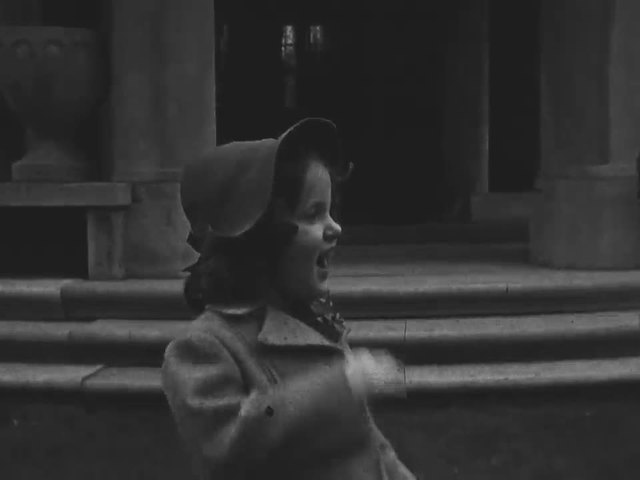
Hanni
Cousin of Ivan, Alexander, and Michael Illich
-
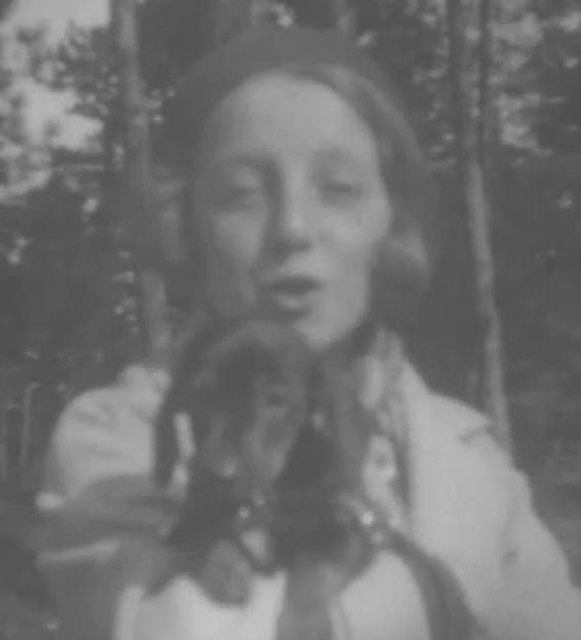
Eva Altmann
Born in Vienna as a daughter of Grete (nee Flack) and Emil Altmann; emigrates together with her family to the USA after the Anschluss; marries the American GI Manny Rabinowe; two mutual children [According to Mautner, Unsere Familiengeschichte, 1958; Interview mit Marianne und Peter Flack in Wien, Mai 2011.]
-
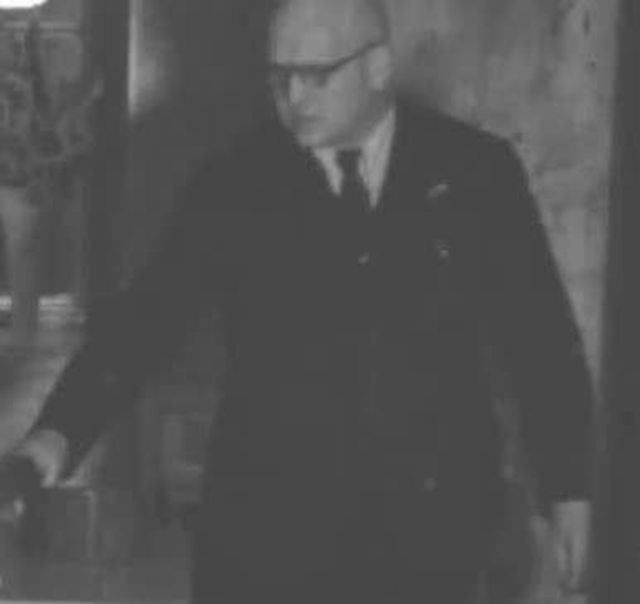
Friedrich Apfelthaler
1889 - 19471910s (amateur) racer and member of the Viennese Automobil-Club; founder of a commercial firm for car tires and car components; marriage with Leopoldine (nee Hackel); one mutual son: Herbert (1925). 1920s ambitious film amateur; member of the Klub der Kinoamateuere Österreichs (DdKÖ). 1947 Friedrich Apfelthaler dies in Vienna
-
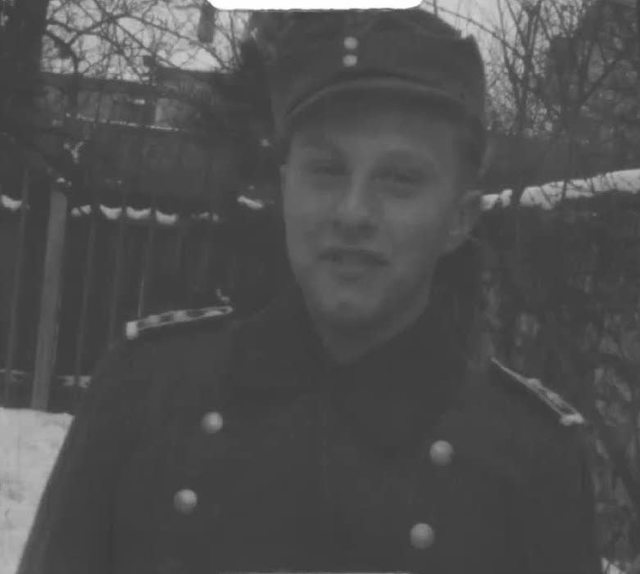
Herbert Apfelthaler
Nov 17, 1925 - Oct 09, 2008Born in Vienna as a son of the tire dealer Friedrich Apfelthaler; since his youth ambitious film amateur. (around) 1931-1941 goes to school in Vienna. (around) 1942/43 Reichsarbeitsdienst (RAD). 1947 death of his father. 1951 marriage with Hedy; 1950s/60s assistance in the family business. 1964 death of the mother; turns to the company Eumig: movie adviser and head of the Eumig Filmstudios; establishes his own film studio (Schmalfilmzentrum Rosenhügel; by 1970 Film- und Viedozentrum Rosenhügel). (around) 1984 marriage with Angelika. 2008 Herbert Apfelthaler dies in Vienna.
-
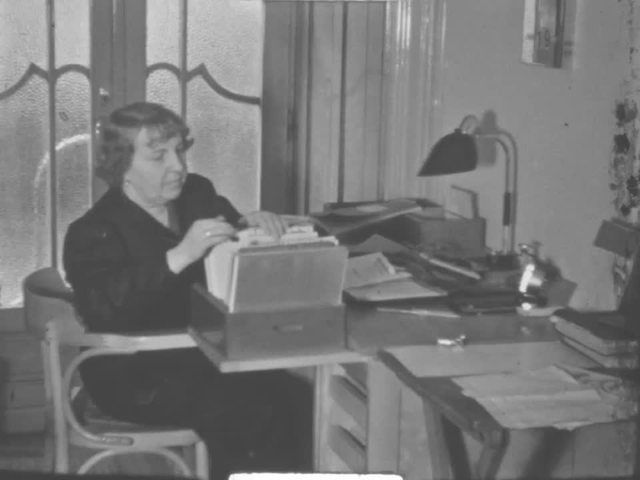
Leopoldine Apfelthaler
Oct 02, 1890 - Mar 07, 1964Nee Hackel; authorized signatory of her future husband’s (Friedrich Apfelthaler) commercial firm; mutual son: Herbert (1925). 1947 death of her husband. 1964 Leopolidne Apfelthaler dies in Vienna
-
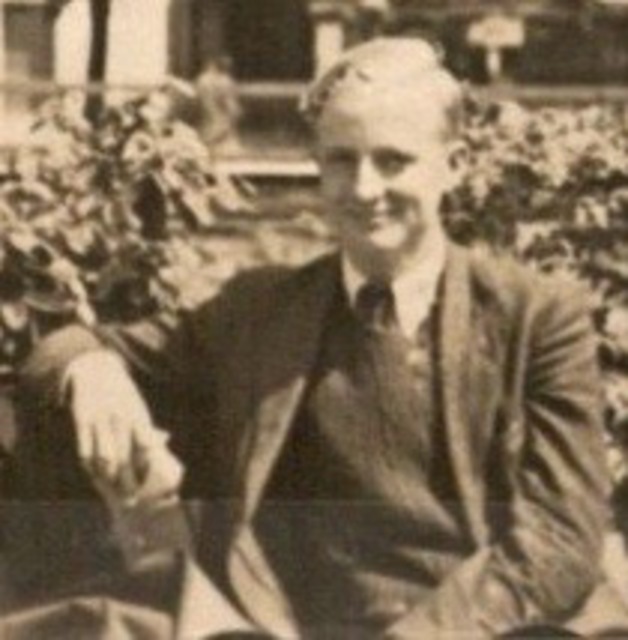
Stanley Baker
(Stan Baker)
Jul 31, 1921Son of Helen and Ross, Brother of Raymond and Frederick Baker
Stanley Allen Baker (and twin brother Raymond Davis Baker) was born in Syracuse, New York on July 31, 1921 to Helen and Ross Baker. He accompanied his father on sabbatical leave to take courses in microchemistry at the University of Vienna from early 1937 until May 1938. His mother and two brothers also made the trip and witnessed the transformation of Austria as it was absorbed into Nazi Germany. In May 1938, the family accompanied Ross to Rome and also witnessed public events for the summit meeting of Hitler and Mussolini. They travelled the rest of the summer and then returned to the US. Stanley married Miriam Loague on September 1, 1943 . Stan donated his family’s collections of films, documents, Helen’s detailed diary and letter, Nazi toy soldiers, postage stamps, and other items from their time in Vienna and Rome to the United States Holocaust Memorial Museum in 2006.
-
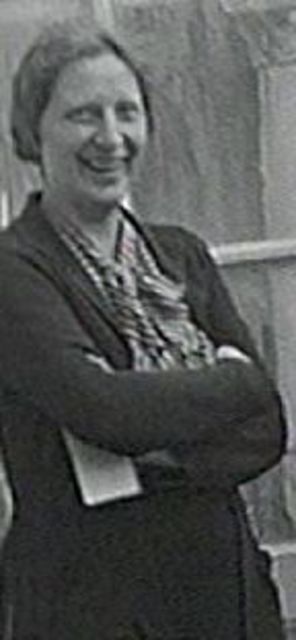
Helen Baker
(Helen Fredericka Baker)
Mar 19, 1889 - Aug 29, 1964Wife of Ross, Mother of Frederick, Raymond, and Stanley Baker
Helen was born in Chicago, Illinois, to Alice and Frederick Porter. She studied at Baker University in Kansas from 1912 to 1913. She married Ross Allen Baker on December 30, 1914. The couple had five sons: Philip, Porter, Frederick, Stanley, and Raymond. She accompanied her husband on sabbatical leave to take courses in microchemistry at the University of Vienna from early 1937 until May 1938. They took three of their five sons; summers were spent in travel. Helen kept a detailed diary during this period when they witnessed the transformation of Austria as it was absorbed into Nazi Germany. Her diary describes how Nazi flags, armbands, and swastikas appeared everywhere on March 11, 1938, as if by magic; a few days later German troops marched into the city and Austria was annexed to the Third Reich. Helen writes vividly in her diary of the chaos in the streets, the overwhelming amount of propaganda disseminated in the run up to the April vote, and the distress of her Jewish acquaintances. Her diary tells of her visits to several Jewish shops guarded by Nazis to see if she will be allowed to enter, and Ross Baker captured one of these attempts on the Vienna film reel In May 1938,the family accompanied Ross to Rome and also witnessed public events for the summit meeting of Hitler and Mussolini. They travelled the rest of the summer and then returned to the US. Helen died in August 1964.
-

Ross Baker
(Ross Allen Baker)
Nov 13, 1886 - Nov 18, 1978Husband of Helen, Father of Frederick, Raymond, and Stanley Baker
Ross Allen Baker was born on November 13, 1886, in Greencastle, Indiana, to Philip S. and Luemma Allen Baker. His father was a chemistry professor at DePauw University. Ross received a BA in chemistry from DePauw and a PhD in 1914 from the University of Wisconsin. He married Helen Fredericka Porter on December 30, 1914. The couple had five sons: Philip, Porter, Frederick, Stanley, and Raymond. He held various teaching positions throughout the US and in England. He was a national counselor for the Boy Scouts of America and helped write the merit badge booklet. During World War I (1914-1918), Ross served in the Chemical Warfare Service specializing in the use of mustard gas. He later became active in efforts to have nations ban the use of biological and chemical weapons in the League of Nations, and later in the United Nations. He was active in several professional associations. In 1928, he was a US delegate for an International Union of Chemistry meeting at the League of Nations and, in 1938, a US delegate to the International Congress of Chemistry in Rome, Italy. In 1937, Ross held a position as professor of chemistry at the City University of New York. During the 1930s, there had been technological advances in optics and photography in European universities and American scientists sought to emulate this work. Ross received a sabbatical leave to take courses in microchemistry at the University of Vienna. Ross, his wife, and three of their five sons lived in Vienna from early 1937 until May 1938; summers were spent in travel. In May 1938, the family accompanied Ross to Rome and also witnessed public events for the summit meeting of Hitler and Mussolini. They travelled the rest of the summer and then returned to the US. Ross retired from San Diego State. He passed away, age 92, in 1978 in San Diego, Ca.
-
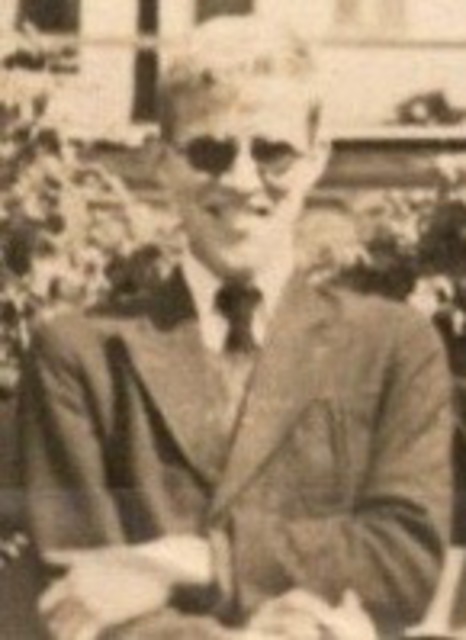
Raymond Baker
(Ray Baker)
Jul 31, 1921 - Sep 05, 1958Son of Helen and Ross, Brother of Stanley and Frederick Baker
Raymond Davis Baker (and twin brother Stanley Allen Baker) was born in Syracuse, New York on July 31, 1921 to Helen and Ross Baker. He accompanied his father on sabbatical leave to take courses in microchemistry at the University of Vienna from early 1937 until May 1938. His mother and two brothers also made the trip and witnessed the transformation of Austria as it was absorbed into Nazi Germany. In May 1938, the family accompanied Ross to Rome and also witnessed public events for the summit meeting of Hitler and Mussolini. They traveled the rest of the summer and then returned to the US. He died on September 5, 1958.
-
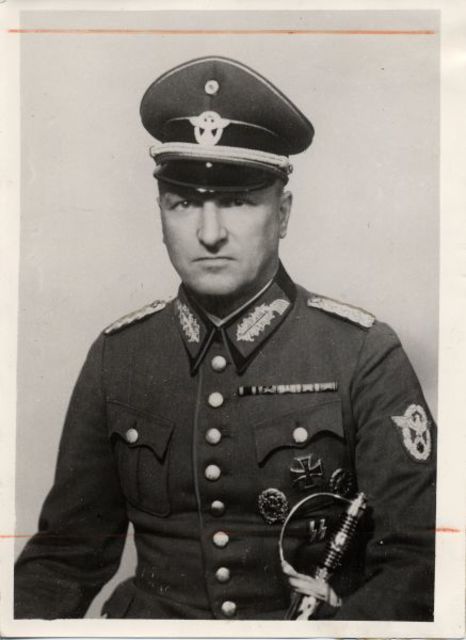
Herbert Becker
Mar 13, 1887 - Jan 03, 1974Born in Torgau (Saxony). 1906 Abitur; later professional military. 1907 Lieutenant. 1914-1918 Participation in World War I. 1915 Captain; later adjutant of the division. 1919-11 Commencement of duties in the Prussian Sicherheitspolizei. 1933 NSDAP. 1936 Colonel of the Schutzpolizei and inspector of the Ordnungspolizei. 1938-03-19 Heads Marschgruppe in Vienna and Graz. 1938-05 Commander of the Schutzpolizei Vienna. 1938-06 Inspector of the Ordnungspolizei Wien. 1938-11 SS-Standartenführer 1939-09 Commander of the Ordnungspolizei in the military district Lodz; later commander of the Ordnungspolizei in the Generalgouvernement, operating from Krakow. 1940-10 Inspector of the Ordnungspolizei Hamburg. 1942 SS-Gruppenführer. 1943-07 Generalinspekteur of the Schutzpolizei in Hauptamt Ordnungspolizei. [According to: Klee, Personenlexikon zum Dritten Reich, 2007.]
-
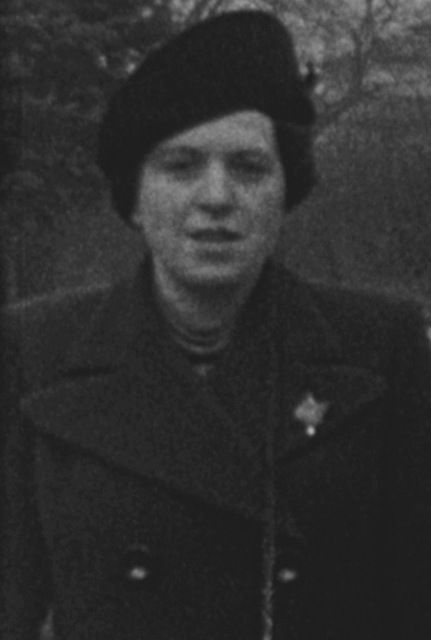
Mina Beller
(Minna Tennenbaum)
Jun 06, 1906 - Mar 04, 2006Mina Tennenbaum (sister of Emil and Marcus and mother of Paul Beller) was born on June 6, 1906. She married Leo Beller on November 18, 1928 in the Siebenbrunnen-temple in Vienna. She escaped Nazi-occupied Vienna and arrived in the United States in late January 1940. Her husband, Leo Beller, was imprisoned on the island of Mauritius for several years before making it to the US in 1946.
-
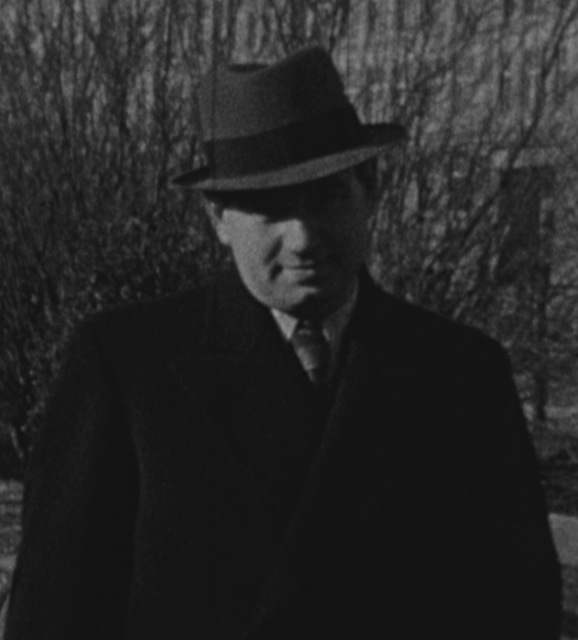
Leo Beller
(Simche Leib Beller)
Mar 20, 1901Husband of Mina, Father of Paul Beller
Leo (Simche Leib) Beller was born to an agricultural family in Bubrika, Galicia (today, Ukraine). He moved to Vienna in 1915 and married Mina Tennenbaum on November 18, 1928 in the Siebenbrunnen-temple of Vienna. He was employed in a hardware store and taken in as a partner in the Tennenbaum family's established plywood business. Since he was not an Austrian citizen and considered stateless, he decided to undergo (unnecessary) appendix surgery and escaped to Bratislava. He waited out the war in a British detention facility on the island of Mauritius, where he had been sent after being caught trying to enter Palestine illegally. After the war, he was allowed to immigrate to the United States, sailing on a freighter that arrived in Baltimore in July 1946. Mina arrived in the US in late January 1940. Their son, Paul, was rescued by the efforts of the American couple Gilbert and Eleanor Kraus as one of the Fifty Children.
-
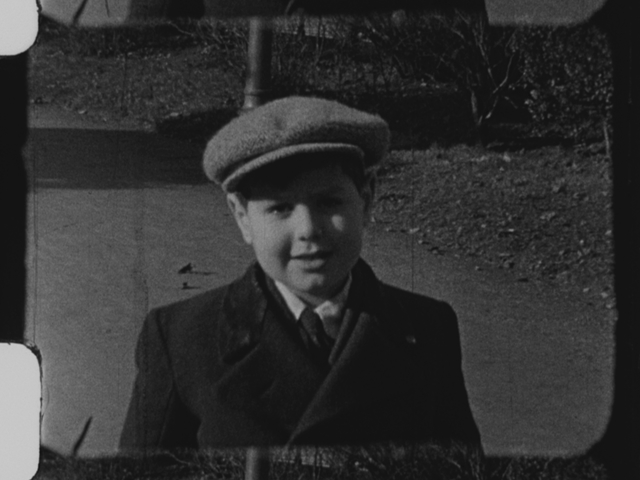
Paul Beller
Nov 20, 1931Son of Leo and Mina Beller
Paul Beller was born on November 20, 1931 in Vienna to Leo and Mina (Tennenbaum) Beller. He was one of the Fifty Children rescued in 1939 by the Americans, Gilbert and Eleanor Kraus. Paul lived with the Amram family in Feasterville, Pennsylvania, for about a year. His mother, Mina, obtained a visa for the United States, arrived in late January 1940, and settled in New York City. His father, Leo, waited out the war in a British detention facility on the island of Mauritius, where he had been sent after being caught trying to enter Palestine illegally. After the war, he was allowed to immigrate to the United States, sailing on a freighter that arrived in Baltimore in July 1946 Paul attended City College of New York and later obtained a master's degree in public administration from New York University. He spent two years int he U.S. Army, after which he began a forty-year career with the federal government, most of it working for the national Medicare office his Maryland. Paul and his wife, Glenda, have three children, seven grandchildren, and three great-grandchildren. They live in New Jersey.
-
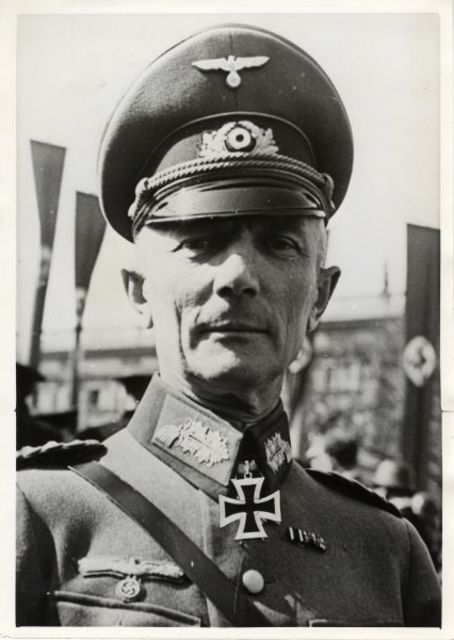
Fedor von Bock
Dec 03, 1880 - May 04, 1945Born in Küstrin (Kostrzyn nad Odra, Poland) as a son of a Prussian major general. Attendance of the cadet school in Groß-Lichterfelde. 1898 Joins the Prussian Army. 1910 General Staff training; by 1911 in the Major General Staff (Großer Generalstab). 1913 Captain of the General Staff in the guard corps. 1914-1918 Field Officer in World War I. 1918 After the end of the war General Staff officer of the Reichswehr; at the same time commander of the paramilitary organisation ”Schwarze Reichswehr“ 1925 Colonel. 1929 Major general. 1931 Lieutenant general. 1935 Gets promoted to the general of infantry and commander-in-chief of the Gruppenkommando 3; Bock serves as commander-in-chief at the Anschluss in Austria (8.Army), the invasion in Poland (3./4.Army), Netherlands and Belgium (Heeresgruppe B). 1940-07 Field marshal. 1941-06 Commander-in-chief of the Heeresgruppe Mitte in the invasion of the Soviet Union. 1941-12 Due to his criticism against Hitler’s war strategy Bock gets replaced. 1942-01 Commander-in-chief of the Heeresgruppe Süd; again dispute with Hitler (Unternehmen Braunschweig / Operation Brunswick). 1942-07 Bock gets impeached. 1945 is wounded heavily in an air attack in Lensahn (Schleswig-Holstein); dies the following day in the military hospital in Oldenburg (Schleswig-Holstein). [According to: Klee, Personenlexikon zum Dritten Reich, 2007; Neue deutsche Biographie, Bd. 2, Berlin, 1955.]
-
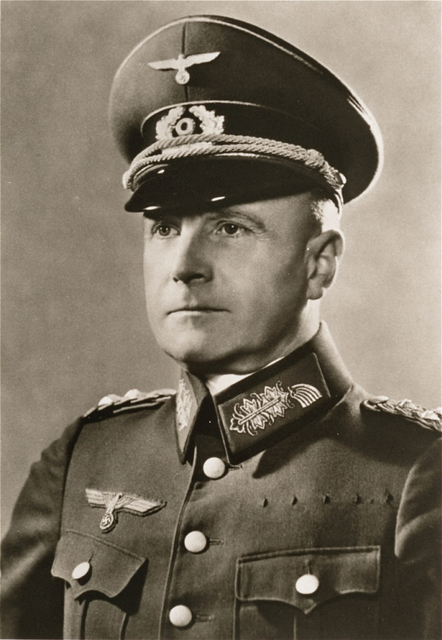
Walther von Brauchitsch
(Walther Heinrich Alfred Hermann von Brauchitsch)
Oct 04, 1881 - Oct 18, 1948Field marshal
Born in Berlin as a son of a general. 1895 - 1900 Cadet school in Berlin. 1900 Lieutenant. 1912 Great general staff. 1914 - 1918 General staff officer. 1921 Major of the Reichswehr (field officer; troop recruitment). 1927 Field officer of the Wehrkreis VI. 1928 Colonel. 1929 Department head of the army training in the Ministry of Defense. 1933 Commander of the Wehrkreis I. 1936 General. 1937 Commander-in-chief of the motorized troops. 1938 Due to the Blomber-Fritsch-crisis Brauchitsch becomes commander-in-chief of the army. 1939 - 1941 Conducts campaigns against Poland, France, Yugoslavia, Greece and the Soviet Union. 1940-07 Field Marshal General. 1941-12-19 Because of military setbacks (Soviet Union) Brauchitsch gets removed to the Führerreserve; Hitler takes over supreme command. 1945 Detention and military arrest; testimony in the Nuremburg Trials. 1948 Brauchitsch dies from cardiac failure in British captivity. [According to: Klee, Personenlexikon zum Dritten Reich, 2007; Deutsches Historisches Museum - online (2015).]
-
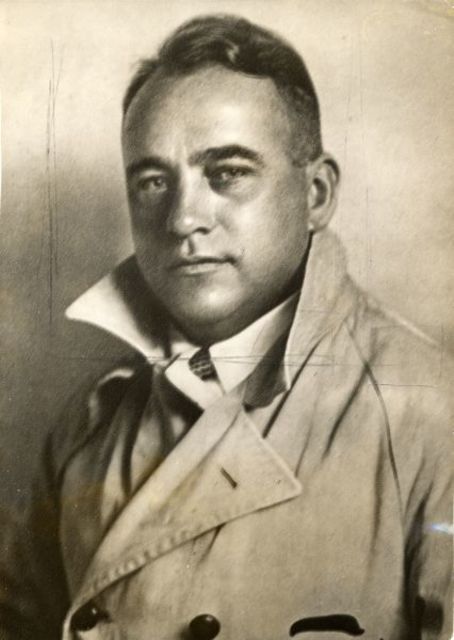
Josef Bürckel
Mar 30, 1895 - Sep 28, 1944Born in Lingenfeld (Rhineland-Palatine) as a son of a baker. 1909 - 1919 Teacher educational establishment Speyer (elementary school teacher). 1914 - 1916 War volunteer. 1920 - 1927 Substitute Teacher. 1921/25 NSDAP. 1926 - 1936 Gauleiter Rhenish Palatinate. 1929 - 1944 Publisher of several magazines (“Eisenhammer“, “NSZ-Rheinfront“, et cetera). 1930 - 1944 Member of the Reichstag. 1933 - 1935 NS-Representative for the Saargebiet. 1933 SA-Gruppenführer. 1934-08 - 1935-02 Saarbevollmächtigter (Saar Agent) of the government. 1934 NSKK-Gruppenführer. 1935-03 - 1936-06 Reich commissar for the reintegration of the Saargebiet. 1936-06 - 1940-04 Reich commissar for the Saarland. 1936-11 SA-Obergruppenführer. 1937-11 SS-Gruppenführer. 1938-03-13 provisional leader of the NSDAP in Austria; agent of the Führer for the implementation of the referendum in Austria. 1938-04 - 1940-03 Reich commissar for the reunion of Austria and the German Reich. 1938-04 NSKK-Obergruppenführer. 1939-01-30 - 1940-08-02 Gauleiter of Vienna. 1939-03 temporary leader of the civil government in Moravia. 1939-05-01 - 1940-03-31 Leader of the Reichsgau Vienna. 1939-05-04 - 1940-03-31 Duties of the Reichsstatthalter in Austria. 1940-04 - 1941-03 Reich commissar for the Saarpfalz. 1940-08 - 1944-09 Head of the civil government in the Département Moselle (Lorraine). 1940-10 Order regarding the Wagner-Bürckel-Mission. 1941-03 - 1944-09 Reichsstatthalter in the Westmark (Palatinate, Saarland, Lorraine). 1942-01 SS-Obergruppenführer. 1944 Bürckel dies under not fully cleared circumstances in Neustadt an der Weinstraße (Rhineland-Palatine). [According to: Klee, Personenlexikon zum Dritten Reich, 2007; Bayrische Landesbibliothek - Online, 2015.]
-
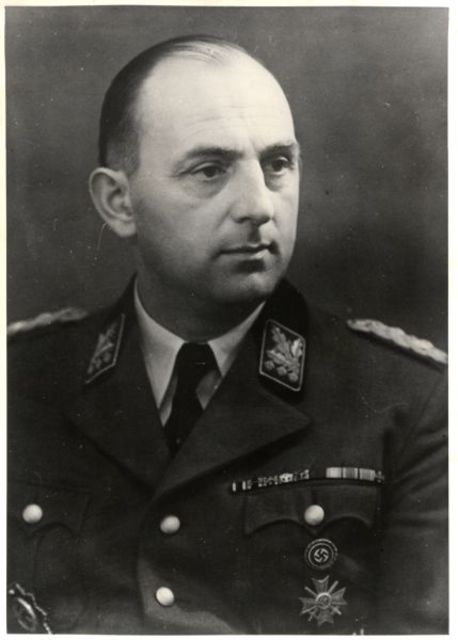
Kurt Daluege
(Kurt Max Franz Daluege)
Sep 15, 1897 - Oct 23, 1946Born in Kreuzburg (Upper Silesia) as a son of a bureaucrat in the middle grade. 1914 Wandervogel Movement. 1916 Notabitur (“emergency abitur”); war volunteer on the Western front. 1918 Second sergeant. 1918 - 1921 Head of the Selbstschutz Oberschlesien. 1921 - 1924 Studies construction engineering at the Technische Hochschule Berlin (1924 Dipl.-Ing). 1922 Deutschvölkischer Schutz- und Trutzbund. 1923 NSDAP. 1923-11-08/09 Hitler’s confident in Berlin during Hitler’s coup in Munich. 1926-03 Founder, till 1929 Gruppenführer of the SA Berlin. 1926 - 1928 Deputy NSDAP-Gauleiter of Berlin-Brandenburg. 1929-06 Reichsführung SA. 1930-06 Switches from the SA to the SS; leader of the SS Berlin. 1931 - 1933 Leader SS-Gruppe Ost. 1933-05 Assistant Secretary of state and head of the department of police in the Prussian Ministry of Interior. 1933-09 General of the Prussian Landespolizei. 1933-11 Member of the Reichstag. 1933 - 1945 Prussian Staatsrat. 1934 Participation in the Röhm-Affair; is assigned with the “cleansing” and reorganization of the SA-Gruppe Ost. 1936-06 Deputy of Himmler as head of the German Police in the Ministry of the Interior and head of the Ordnungspolizei in the Hauptamt der Sicherheitspolizei. 1942-04-20 SS-Oberst-Gruppenführer und colonal general of the police. 1942-06 (Deputy) Reichsprotektor in Bohemia and Moravia. 1943-08 after cardiac infarction politically “neutralized”; is imdenified with the manor Ilseanau. 1945-05 arrested in Lübeck. 1946 Daluege gets extradited to Czechoslovakia and is sentenced to death by the Prague people’s court. [According to: Klee, Personenlexikon zum Dritten Reich, 2007; Deutsches Historisches Museum - online (2015).]
-
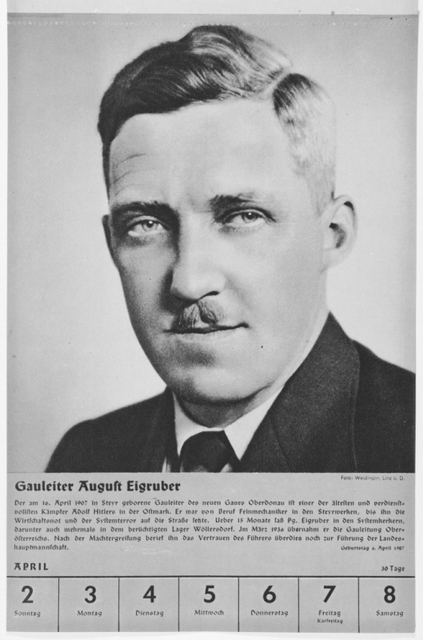
August Eigruber
Apr 16, 1907 - May 28, 1947Born in Steyr (Upper Austria) as an illegitimate son of a grocer. Education to become a surveying technician. 1922 NS Working Youth Austria. 1925 Führer NS Working Youth Austria. 1928 NSDAP. 1930 NS-Bezirksleiter for Steyr-Land. 1934 Spends several months in prison due to illegal NS activities (1933-06 NSDAP party ban). 1935 Gaugeschäftsführer. 1936 Gauleiter of the forbidden NSDAP Upper Austria. 1938 - 1945 Member of the Reichstag. 1938-03 SA. 1938-03-14 Governor of Oberdonau. 1938-04-10 Ministerialrat. 1938-05 SS; Gauleiter Oberdonau. 1939 SS Brigadenführer. 1940 SS Gruppenführer. 1940-04 Reichsstatthalter Oberdonau. 1942-11 Reichsverteidigungskommissar Oberdonau. 1943 SS Obergruppenführer. 1945 Eigruber is responsible for several crimes in the end phase of the war (e.g. „Mühlviertler Hasenjagd“). 1945-05 American war captivity. 1946-05-13 Sentenced to death in the Mauthausen main trial because of his responsibility for crimes occured in the concentration camp Mauthausen. 1947 Execution in the war criminal prison Landsberg. [According to: Klee, Personenlexikon zum Dritten Reich, 2007.]
-
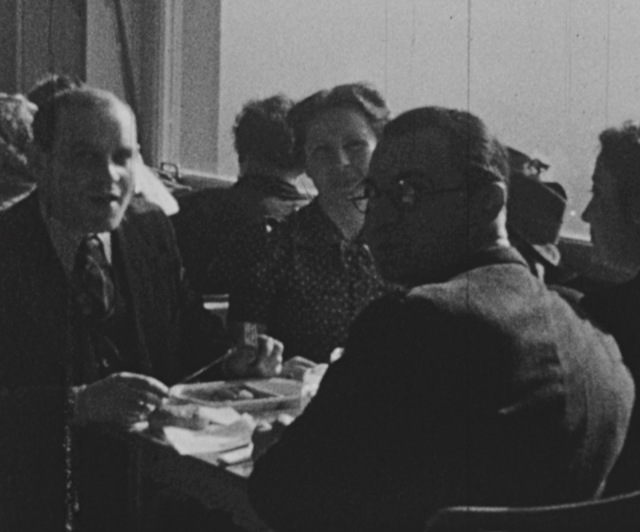
Victor Ergas
Jun 30, 1893 - Apr 07, 1945Friend of the Tennenbaum Family
Victor Ergas was born in Bucharest in 1893. As Marcus Tennenbaum prepared to flee Austria, he shipped many of his family's possessions to Jules Pressner and Victor Ergas in Paris. Marcus reclaimed the items when he and his family passed through Paris on the way to board the Queen Mary in Cherbourg in March 1939. Marcus writes in his memoir that Ergas was deported from Paris in 1944. He arrived at Gusen (Mauthausen) in January 1945 and died there on April 7, 1945.
-
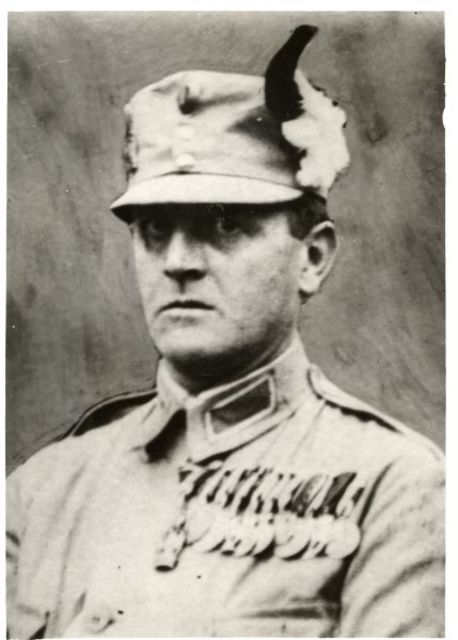
Emil Fey
Mar 23, 1886 - Mar 16, 1938Born in Vienna as son of a clerk. 1904 One-year volunteer. 1908 Regular officer. 1914 - 1918 Participation in World War I; captain. 1931 Landesführer of the Viennese Heimatschutz. 1932-10 - 1934-07 alternating Minister, State Secretary and Vice Cancellor in the Cabinet Dollfuß. 1934-01/02 Major role at the formation and the abolition of the Februaraufstand. 1934-07-25 Fey’s role at the Nazi’s July Coup 1934 remains unknown. 1934-07 - 1935-10 Minister in the Cabinet Schuschnigg. 1935-11 Is desposed as Landesführer of the Viennese Heimatschutz; president of the Donaudampfschiffahrtsgesellschaft (DDSG). 1936-10 Government suspends the Heimwehren. 1938-03-15 Examination through the Gestapo. 1938 Fey, his wife and his son are found shot in their apartment in Vienna; probably murder-suicide. [According to: Neue Deutsche Biographie, Bd. 5, Berlin 1961; Österreichisches Biographisches Lexikon - Online Edition (2015).]
-
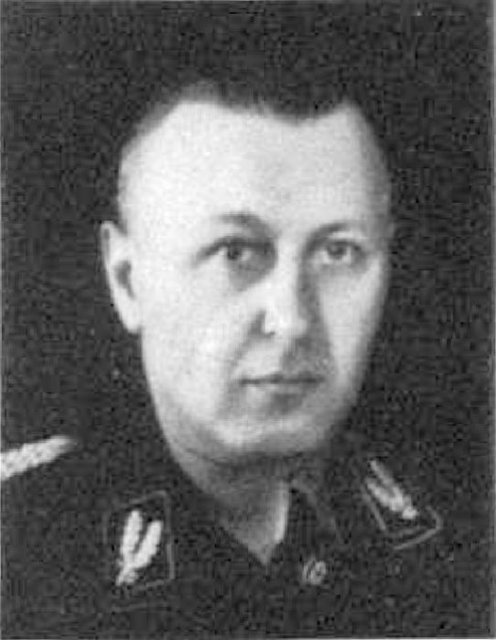
Josef Fitzthum
Sep 14, 1896 - Jan 10, 1945Born in Loimersdorf (Lower Austria) as a son of a k.u.k. bureaucrat. Attendance of the Austrian War Academy. 1916-1918 Participation in World War I (1916: lieutenant; 1916: first lieutenant). 1923-1933 Secretary at the Vienna Kunstgewerbeschule. 1931-04 NSDAP. 1932 SS-Sturmbannführer. 1933 Imprisonment due to NS-activities. 1936-03 Deprivation of citizenship; SS-Führer in the German Reich. 1937-10 – 1938-03 Security agency of the Reichsführer SS. 1938 Member of the Reichstag. 1938-03 SS-Oberführer. 1938-03-12 – 1940-03 Vice chief of police in Vienna; displaced because of corruption (Arisierung). 1940-1943 Commander of SS-Totenkopfstandarten and SS infantry divisions. 1942-04 – 1943-05 Arranges foreign volunteer organisations of the Waffen-SS in Flanders and the Netherlands. 1943-10 – 1945-01 Representative of the Reichsführer-SS in Albania (operating from Tirana). 1944-08 SS-Gruppenführer. 1945 Dies in a traffic accident near Vienna-Neudorf. [According to: Klee, Personenlexikon zum Dritten Reich, 2007.]
-
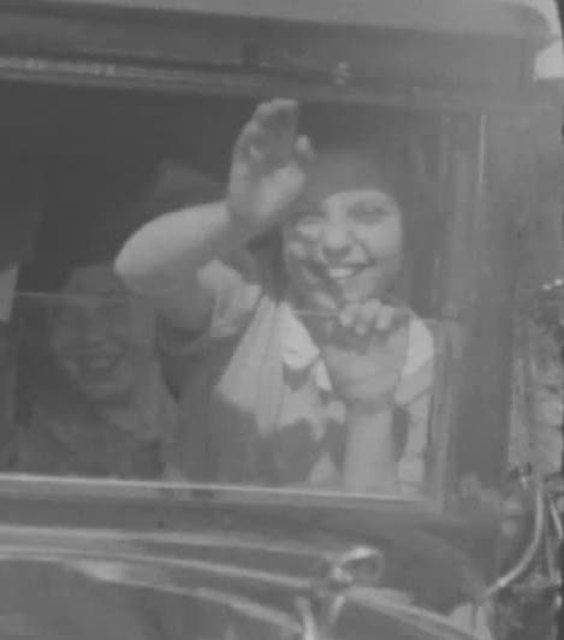
Erika Flack
Born in Vienna as a daughter of Lilly (nee Herzog) and Felix Flack. 1939-04 immigrates with her parents to London. 1942 move to Surrey; attendance of College there; later art studies in Cambridge; works as an art teacher in London; later she moves to Melbourne. [According to Mautner, Unsere Familiengeschichte, 1958; Interview mit Marianne und Peter Flack in Wien, Mai 2011.]
-
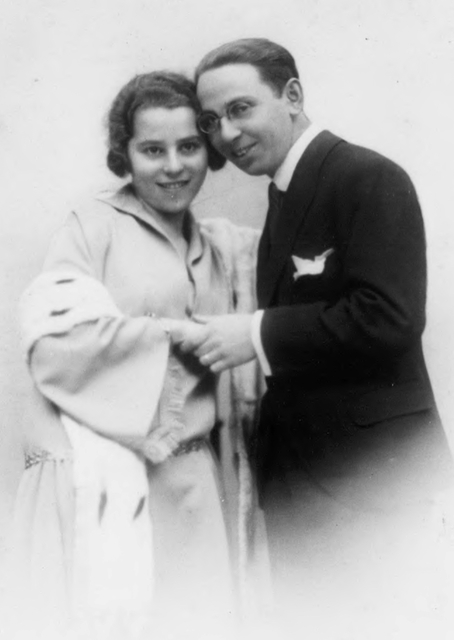
Johann Flack
(John Flack)
Jul 10, 1896Born in Vienna as the youngest son of Mathilda (nee Fuchs) and Josef Flack; in the 1920s together with his brother Hans in Berlin; in the 1930s he works as a manager at the dry cleaner’s “Dandy”; marries Annie (nee Stern); mutual son Thomas; after the “Anschluss” of Austria the family flees to France; after the occupation of France they are hiding partially in the woods. 1945-1949 the family lives in Nimes near Avignon. 1949 the family moves to New York; Johann works there as a carpenter, later as an agent for medical devices. [According to Mautner, Unsere Familiengeschichte, 1958; Interview mit Marianne und Peter Flack in Wien, Mai 2011.]
-

Annie Flack
(Anny Flack)
Annie Flack (nee Stern) marries Johann Flack, the youngest of the Flack siblings; mutual son Thomas; after the Anschluss of Austria the family flees to France; after the occupation of France they are hiding partially in the woods. 1945-1949 the family lives in Nimes near Avignon. 1949 the family moves to New York. [According to Mautner, Unsere Familiengeschichte, 1958; Interview mit Marianne und Peter Flack in Wien, Mai 2011.]
-
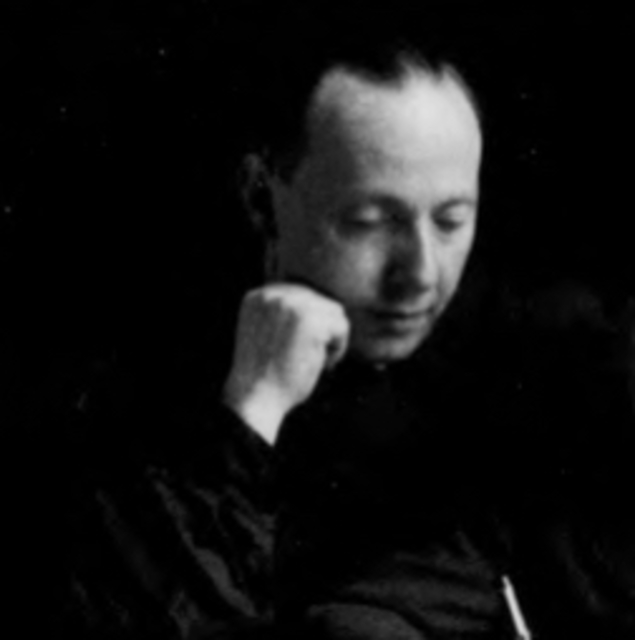
Hans Flack
1899Born in Vienna as a son of Mathilda (nee Fuchs) and Josef Flack; a disease in his childhood leaves him with irreversible damage (stiff leg, harmed growth); however he is considered a sporty person; during the 1920s together with his brother Johann in Berlin; catering-company; deals with people from the film industry; return to Vienna; marries Getrude Stern. 1928 birth of her son Peter; by 1930 she founds the dry cleaner’s “Dandy”; after the Anschluss of Austria flight to Belgium and later on France. 1942-09 detention and deportation to Drancy (Ile-de-France); later Auschwitz; dies in Auschwitz; his wife and son manage to flee to England. [According to Mautner, Unsere Familiengeschichte, 1958; Interview mit Marianne und Peter Flack in Wien, Mai 2011.]
-
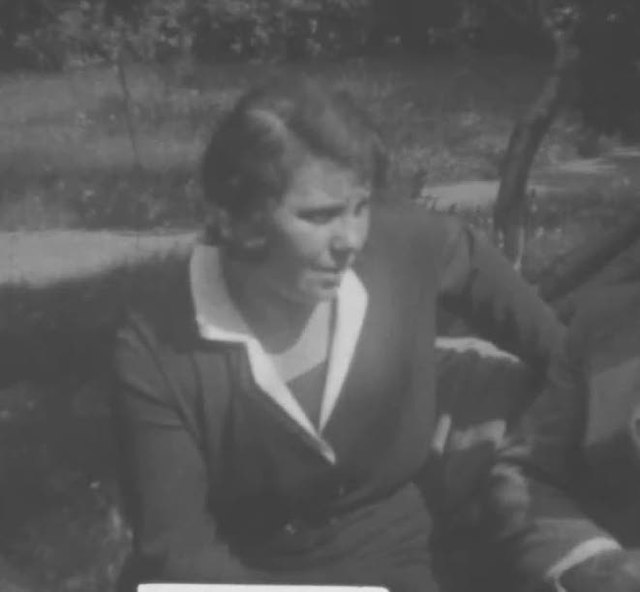
Erna Flack
(Ernestine Flack)
Aug 16, 1885 - 1944Ernestine “Erna” (nee Rosenzweig) marries Emil Flack, the oldest one of the Flack siblings; mutual children Alfred (1911) and Susanne (later on Rosenfeld); after the Anschluss of Austria her husband flees to France where he dies in the detention camp Les Milles (Bouches-du-Rhone). 1942-08 Erna is deported from Vienna to Theresienstadt. 1944-05 transfer to Auschwitz; dies in Auschwitz; both of her children manage to escape to the US. [According to Mautner, Unsere Familiengeschichte, 1958; doew.at - Opfersuche, 2015]
-
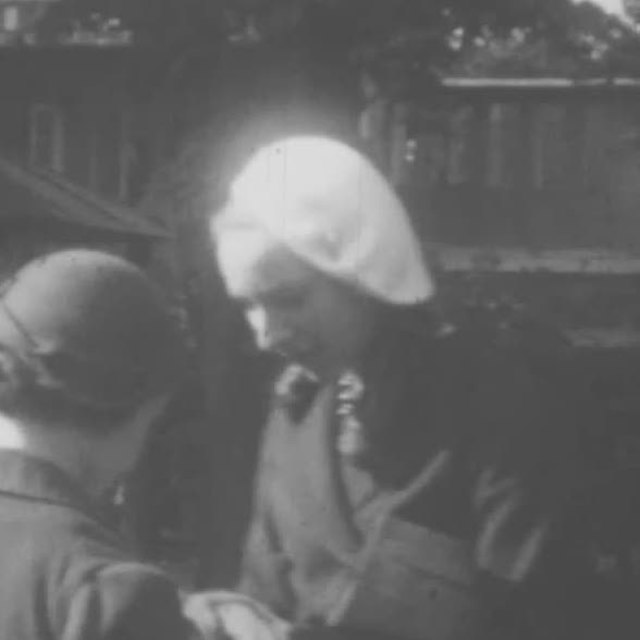
Gertrude Flack
-
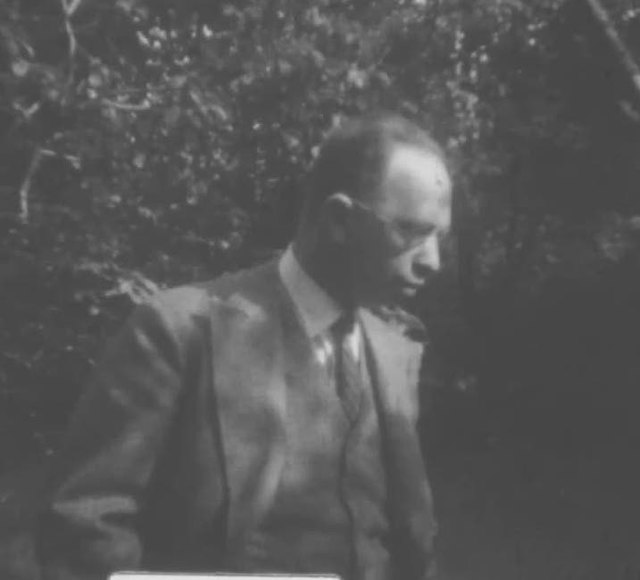
Alexander Flack
(Alex Flack)
Aug 02, 1895 - 1942Born in Vienna as a son of Mathilda (nee Fuchs) and Josef Flack; marries Grete (nee Krämer); mutual daughter Ilse; after the Anschluss of Austria flight to France. 1942-09 detention and deportation to Drancy (Ile-de-France); later Auschwitz; dies in Auschwitz; daughter Ilse manages to flee to Israel. [According to Mautner, Unsere Familiengeschichte, 1958; Interview mit Marianne und Peter Flack in Wien, Mai 2011.]
-
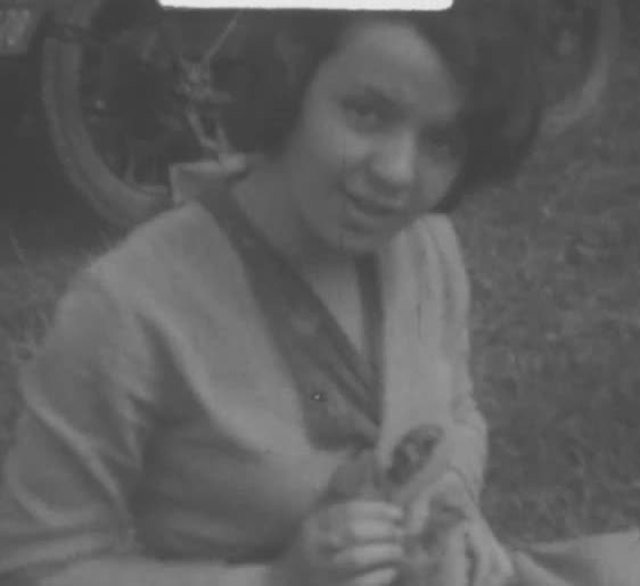
Susanne Flack
(Susan Flack)
Born in Vienna as a daughter of Erna (nee Rosenzweig) and Emil Flack; after the Anschluss of Austria Susanne immigrates together with her older brother Alfred to the United States. 1941 her father dies in in Les Milles. 1944 her mother dies in Auschwitz; Susanne marries Sigi Rosenfeld in the US; two mutual daughters; factory employee; dies in Florida. [According to Mautner, Unsere Familiengeschichte, 1958; Interview mit Marianne und Peter Flack in Wien, Mai 2011.]
-
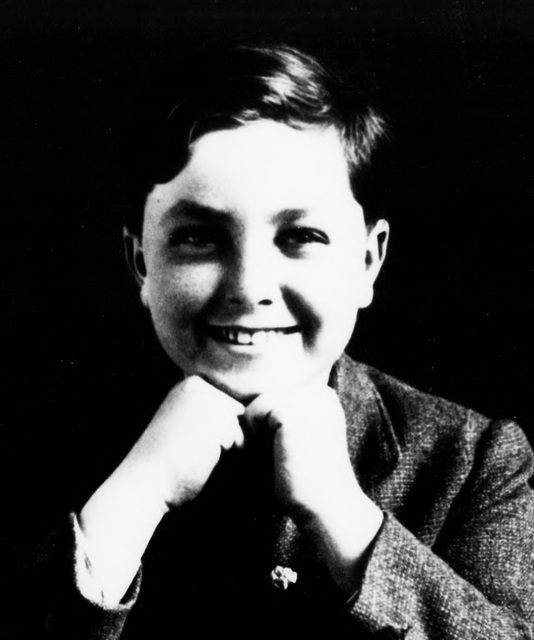
Peter Flack
1928Born in Vienna as a son of Getrude (nee Stern) and Hans Flack; after the Anschluss of Austria Peter immigrates together with his mother to England; his father flees to France. 1942 detention of the father and deportation to Auschwitz. 1945 Peter and his mother move to New York; studies engineering; later marriage with Marianne (nee Mosbacher); two mutual children. [According to Mautner, Unsere Familiengeschichte, 1958; Interview mit Marianne und Peter Flack in Wien, Mai 2011.]
-
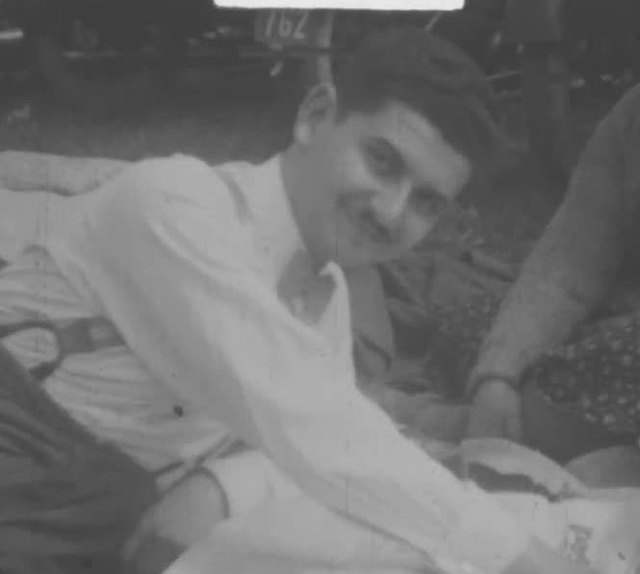
Alfred Flack
(Fred Flack)
May 08, 1911Born in Vienna as a son of Erna (nee Rosenzweig) and Emil Flack; after the Anschluss of Austria Alfred immigrates with his younger sister Susanne (later Rosenfeld) to the United States. 1941 father dies in Les Milles. 1944 mother dies in Auschwitz; Alfred studies engineering in New York. [According to Mautner, Unsere Familiengeschichte, 1958; Interview mit Marianne und Peter Flack in Wien, Mai 2011.]
-
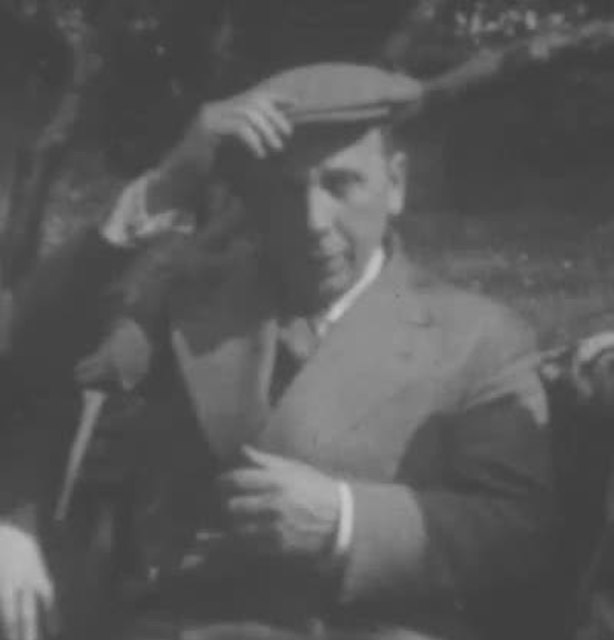
Emil Flack
May 01, 1885 - Oct 05, 1941Born in Trencin (Solvakia) as the oldest son of Mathilda (nee Fuchs) and Josef Flack; marries Ernestine “Erna” (nee Rosenzweig); mutual children Alfred (1911) and Susanne (later on Rosenfeld); after the Anschluss flight to Belgium; later France; detention and imprisonment in Les Milles (Bouches-du-Rhone) where he dies because of a heart disease in 1941; Erna dies in Auschwitz in 1944; both of the children manage to escape to the US. [According to Mautner, Unsere Familiengeschichte, 1958; Interview mit Marianne und Peter Flack in Wien, Mai 2011.]
-
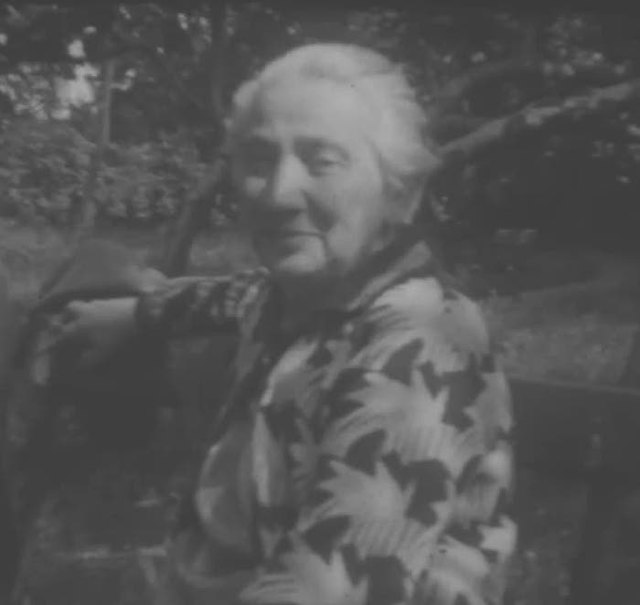
Mathilda Flack
(Mathilda Fuchs)
Dec 10, 1864 - Nov 06, 1936Born as a daughter of Julia (nee Weiss) and David Fuchs; marries Josef Flack (1854-1932) in Trencin (Slovakia); later she moves to Korneuburg near Vienna; gains franchise to run a cafeteria in barracks; moves to Vienna; dairy in Leopoldstadt; later Fouragemagazin in Ottakring; grocery store in Meidling; 1904 closes down her premise; grocery store in Hernals, later in Josefstadt. After end of World War One the grocery store is handed over to her children and is later on sold by them. Children of the marriage: Emil (1885), Felix (1886), Alfred (1887), Adele (1888), Ilka (1892), Alex (1894), Hans (1897), Grete (1897), Johann (1896). [According to Mautner, Unsere Familiengeschichte, 1958; Interview mit Marianne und Peter Flack in Wien, Mai 2011.]
-
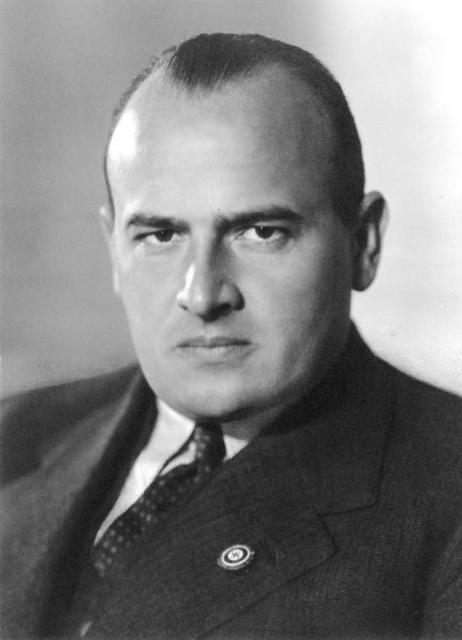
Hans Frank
(Hans Michael Frank)
May 23, 1900 - Oct 16, 1946Born in Karlsruhe as a son of a lawyer. 1919 Thule-Gesellschaft; Freikorps Epp; Deutsche Arbeiterpartei (DAP). 1920 - 1926 Studies law. (1924 Dr. iur; 1926 state examination); counselor-at-law of the NSDAP. 1923 NSDAP; SA. 1923-11-09 Participation in Hitler’s coup in Munich; flees to Austria afterwards. 1924 Return to Germany (termination of proceedings). 1926 Lawyer in Munich; appears for Hitler and his henchmen in various lawsuits (“Rechtsbeistand Hitler”). 1928 Frank founds the Bund Nationalsozialistischer Deutscher Juristen (by 1936 NS-Rechtswahrerbund). 1930 - 1942 Member of the Reichstag. 1930 - 1942 Head of the legal department of the NSDAP-Reichsleitung (by 1935 Reichsrechtsamt der NSDAP). 1933-03/04 - 1934-12 Bavarian Minister of Justice and Reich commissar for the Gleichschaltung of the Justice. 1934 - 1945 Minister portfolio. 1939-10 - 1945-01 Governor-general of the Generalgouvernement (Poland); organizes deportation of Polish Jews to Ghettos and deportation of forced laborers to the German Reich. 1942 Dispute with Himmler concerning the exploitation of the Generalgouvernement. 1942-08 Frank is deposed from all of his offices; remains governor-general however. 1945-05 Arrested by American troops. 1945-10 Sentenced to death in the Nuremberg Trials because of war crime and crimes against humanity. 1946 Execution in Nuremberg. [According to: Klee, Personenlexikon zum Dritten Reich, 2007; Deutsches Historisches Museum - online (2015).]
-
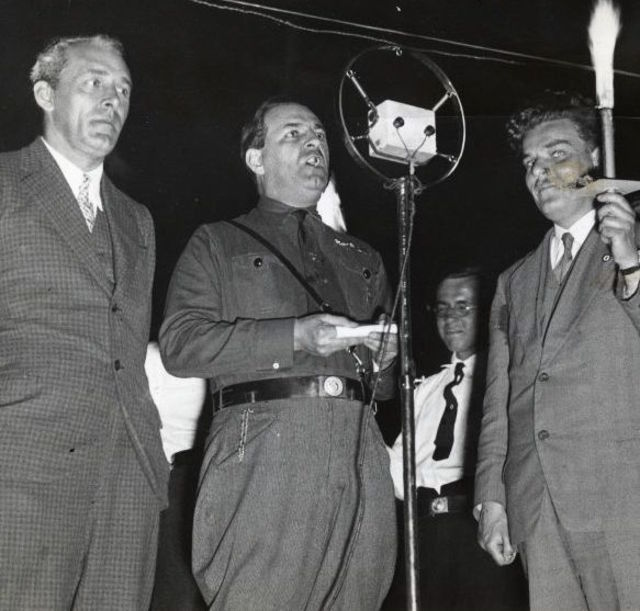
Alfred Frauenfeld
(Alfred Eduard Frauenfeld)
May 18, 1898 - May 10, 1977Born in Vienna as son of an Oberlandgerichtsrat. 1916 Matura; one-year volunteer. 1916 - 1918 Participation in World War I. 1918 - 1920 Studies civil engineering at the Technische Hochschule Vienna. 1920 - 1922 Technical constructor. 1923 - 1929 Bank clerk. 1929 NSDAP; Kreisleiter of Vienna-Wieden. 1930-01-01 Gauleiter of Vienna. 1932 Member of the Viennese Land government, alderman, member of the Landtag and the Gemeinderat. 1933-11 - 1934-05 Arrested because of illegal NS activities (1933-06 NSDAP party ban in Austria). 1934-06 Flees to the German Reich. 1935-06 Manager of the Reichstheaterkammer; member of the Reichskulturamt; publisher of several newspapers. 1936 Member of the Reichstag; Reichsredner (“Reich speaker”) of the NSDAP. 1936 - 1940 Servant of the Ministry of Foreign Affairs. 1940 Consul general in Oslo; participation in the western campaign. 1941 Participation in campaigns invading the Balkans and the Soviet Union. 1941 - 1944 Commissary general for Taurien (Crimea). 1945 American war captivity; imprisonment in Aldringen and Dauchau. 1946 Testimony in the Nuremburg Trials; release. 1947 Frauenfeld gets sentenced in absentia to 15 years of prison in Vienna; works for a private construction company in Hamburg. 1949 According to British secret service member of the NS secret society “Bruderschaft” (“brotherhood”). 1977 Frauenfeld dies in Hamburg. [According to: Klee, Personenlexikon zum Dritten Reich, 2007.]
-
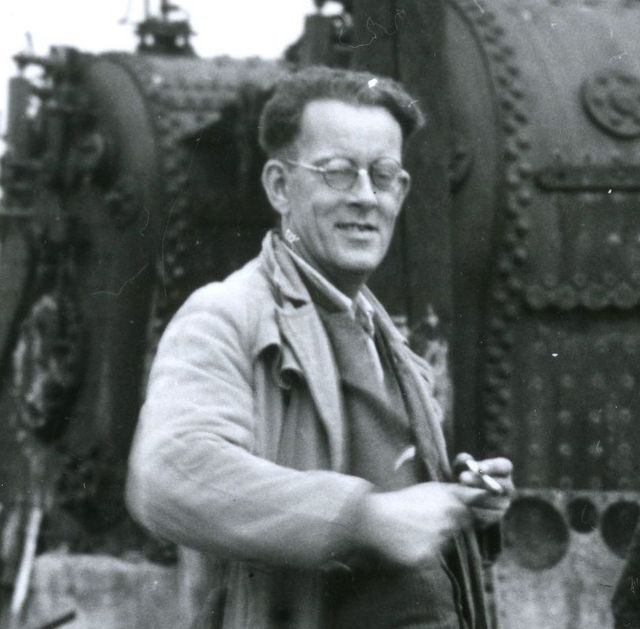
Hermann Fritsche
-
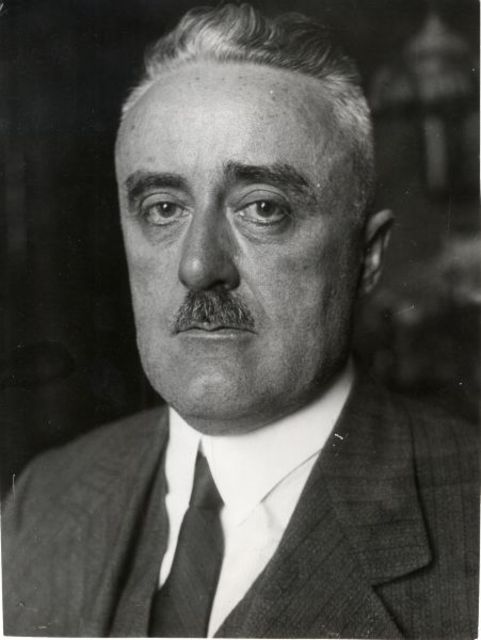
Edmund Glaise-Horstenau
(Edmund Glaise von Horstenau)
Feb 27, 1882 - Jun 20, 1946Born in Braunau/Inn (Upper Austria) as a son of a k.u.k. cavalry captain. Attendance of the Theresian Military Academy. 1903 Regular officer and General Staff training in war academy; General Staff officer in the Salzburg brigade. 1913 Captain in the Vienna Archive of War. 1914 General Staff officer at the front in Galicia. 1915 - 1918 Department for Press and Politics in the high command of the army. 1918 - 1938 Again Archive of War; director of Archive of War by 1925. 1934 Staatsrat. 1936-07-11 Minister in Schuschnigg’s cabinet. 1938 SA; Member of the Reichstag. 1938-03-11 - 1938-03-13 Vice-chancellor of the temporary cabinet of Seyß-Inquart; deputy of the Reichsstatthalter. 1938-03-15 German Minister of Provincial Government under Reichsstatthalter Seyß-Inquart. 1939 Member of the advisory board of the „Forschungsabteilung Judenfrage im Reichsinstitut für Geschichte“. 1940 Honorary professor for army and troop history at the University of Vienna. 1941-04 - 1944-09 Authorised general of the Wehrmacht in Croatia. 1943 SA-Gruppenführer. 1945-04 American war captivity. Suicide in the detention center Langwasser near Nuremberg. [According to: Klee, Personenlexikon zum Dritten Reich, 2007; Neue deutsche Biographie, Bd. 6, Berlin, 1964.]
-
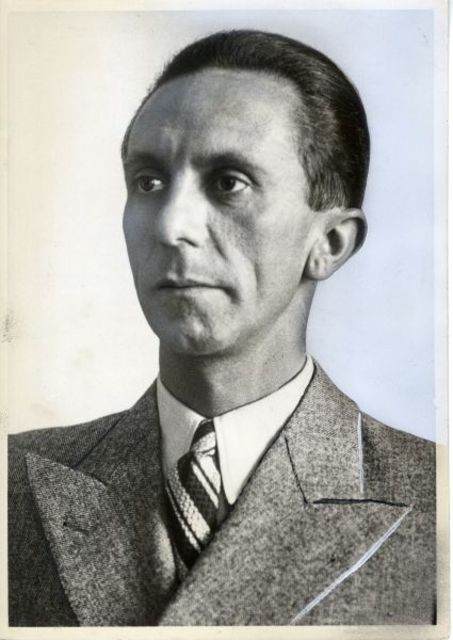
Joseph Goebbels
(Paul Joseph Goebbels)
Oct 29, 1897 - May 01, 1945Reich Minister for Public Enlightenment and Propaganda, Head of the Reich Chamber of Culture
Born in Rheydt (North Rhine-Westphalia) as a son of a clerk. 1914 Volunteers for war; is ineligible for military service due to his limp. 1917 - 1921 Studies German philology and history at various German universities (1922 Dr. phil.). 1921 - 1924 Trys futilely to get hired as a journalist or dramatic advisor. 1924-08 Founding of the NSDAP-Ortsgruppe Mönchengladbach. 1926-10 Gauleiter Berlin-Brandenburg. 1927-07 Publisher of the agitating magazine „Der Angriff“. 1928 - 1945 Member of the Reichstag. 1931 Marriage with Magda Quandt. 1933 - 1945 Minister for public enlightenment and propaganda; head of the Reichskulturkammer. 1941 Goebbels urges the launch of the Yellow Star in the German Reich. 1943-02-18 Sportpalast speech in Berlin (“Totaler Krieg“ – “total war”). 1945 (extended) suicide in the Führerbunker in Berlin. [According to: Klee, Personenlexikon zum Dritten Reich, 2007; Deutsches Historisches Museum - online (2015).]
-
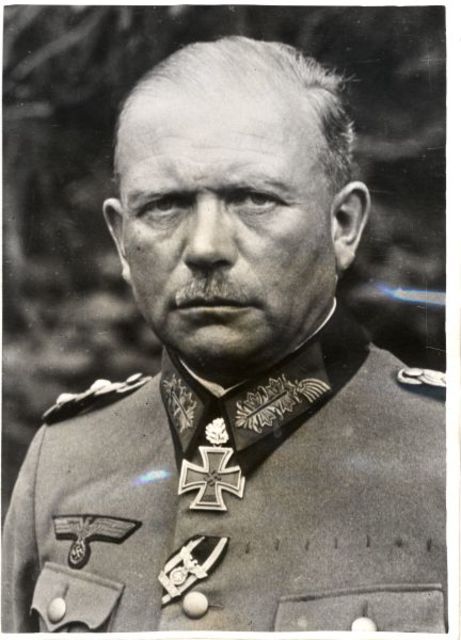
Heinz Guderian
(Heinz Wilhelm Guderian)
Jun 17, 1888 - May 14, 1954Born in Kulm (Western Prussia; pol.: Chelmno) as a son of a lieutenant general. 1907 Joins the army after attendance of cadet school. 1914 Intelligence officier on the Western front. 1917 Switches to the General Staff. 1919 Freikorps Eiserne Division. 1920 Captain, later colonel of the Reichswehr. 1922 - 1924 Inspector of the communication troops in Munich; starts thinking about possible tactical and technical use of motorized troops (decisive for the later setup of German tank divisions). 1924 - 1931 Truppenamt of the army command; commander for the motorist detachment 3; advocates the creating of German tank divisions (forbidden by the Treaty of Versailles). 1931 Chief of Staff of the inspection of the communication troops. 1933 After the takeover of the NSDAP Hitler’s armament plans enable Guderian to set up tank units. 1934 Chief of Staff of the commando of the motorist combat troops. 1935-10 Is assigned to set up the first three tank divisions; gains command of the second tank divison. 1936 Major general. 1938 Lieutenant general and commanding general of the XVI. army corps. 1938-03-12 Guderian marches in with his tank divisions in Austria as part of the “Anschluss”. 1938-10 Guderian takes part in the march in in the Sudetenland. 1938-11 Is appointed general of the tank troops and head of the Schnellen Truppen (“fast troops”). 1939-09/10 Commander of the XIX. army corps during the invasion of Poland. 1940 Decisive participation in the elaboration of the Western offense (“Sichelschnitt”). 1940-05 Commander of the XIX. army corps against France. 1940-06 Colonel-General. 1941-06 Commander of the Panzergruppe 2 during the invasion of the Soviet Union; dispute with Hitler about war strategy; is moved by Hitler to the Führerreserve in 1941-12. 1943-03 Gets reactivated as general inspector of the tank troops at the turning point of the war (Stalingrad). 1944-07 Head of the Chief of Staff. 1945-03 Guderian advocates ceasefire with the Western allies; gets dismissed by Hitler. 1945 - 1948 American war captivity. 1954 Dies in Schwangau bei Füssen (Bavaria). [According to: Klee, Personenlexikon zum Dritten Reich, 2007; Deutsches Historisches Museum - online (2015).]
-
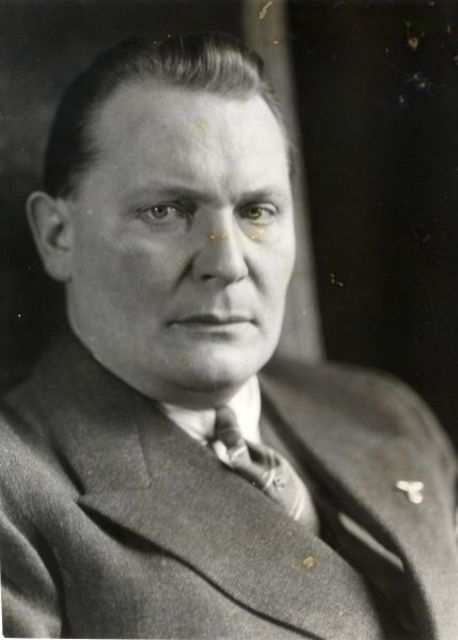
Hermann Göring
(Hermann Wilhelm Göring)
Jan 12, 1893 - Oct 15, 1946Supreme Commander of the German Air Force, Commissioner for the Four Year Plan
Born in Rosenheim (Bavaria) as a son of a diplomat and colonial clerk. 1913 Abitur and Offiziersexamen. 1914 - 1918 Pilot of the German Air Force. 1919 - 1921 Pilot for the civilian aviation. 1922 NSDAP; is appointed SA-Führer by Hitler und is assigned with the organization of the SA. 1923-11 Participation in Hitler’s Coup in Munich; bullet wound (beginning of his morphinism); flees to Tyrol and Italy. 1925 Moves to Stockholm. 1927 (Permanent) return to Germany; promoter for aircraft engines; uses his relationships to raise money for the NSDAP. 1928 - 1945 Member of the Reichstag. 1930 Hitler’s political consultant. 1932-08 President of the Reichstag. 1933-04 Prime Minister of Prussia 1933-05 Minister for Aviation. 1933-08 General of the Infantry. 1934 Reichsforst- and Reichsjägermeister. 1935-03 Commander-in-chief of the air force. 1936-04 Reich commissar for resources and foreign currencies. 1936-10 Reich agent for the four-year plan. 1937 Founding of the Reichswerke Hermann-Göring. 1938 Field marshal of the Wehrmacht. 1939-09 Designated successor of Hitler 1940 Reichsmarschall. 1940/41 and 1942/43 increasing loss of political importance (military failures of the air force; England and Stalingrad; resigns from publicity). 1945-04-23 Göring asks Hitler to take over the state business; interpreted by Hitler as a coup; Göring is deposed from all of his offices; warrant. 1945-05 American war captivity. 1946-10-01 Sentenced to death in the Nuremberg Trials; eludes execution by suicide. [According to: Klee, Personenlexikon zum Dritten Reich, 2007; Deutsches Historisches Museum - online (2015).]
-
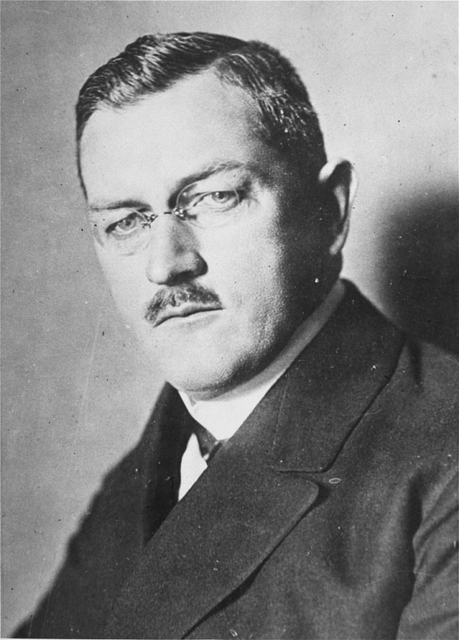
Franz Gürtner
Aug 26, 1881 - Jan 29, 1941Born in Regensburg (Bavaria) as a son of an engineer. 1900 - 1904 Studies law in Munich. 1909 Clerk in the Bavarian Ministry of Justice. 1914 - 1918 Participation in World War I. 1919 Prosecutor in Munich. 1920-08 Landesgerichtsdirektor. 1922-08 Bavarian Minister of Justice; 1923-11 Gürtner thwarts Hitler’s transfer to the Reichsgericht Leipzig; instead the Bavarian Volksgericht sentences him to 5 years of confinement in a fortress. 1932-06 - 1941-01 Minister of Justice. 1933-02-28 Signer of the„Reichstagsbrandverordnung“ (RGBl I, 83). 1934-07 Gürtner legitimates murders in the Röhm-Affair as „federal self-defence“ (Staatsnotwehr). 1937 NSDAP. 1938-08 Signer of the „Namensänderungsverordnung“ (RGBl I, 1044). Gürtner enforces the abolition of the NSDAP ban. Responsibility for the Gleichschaltung of the Justice, the Nuremburg Race Laws and the mass killings of ills. [According to: Klee, Personenlexikon zum Dritten Reich, 2007; Deutsches Historisches Museum - online (2015).]
-

Marie Amalie Herzstark
(Mary Herzstark)
Sep 08, 1875 - 1956Born in Vienna as a daughter of Marie and Georg Toman (master carpenter); attends commercial school in Vienna. 1893 works as an accountant (later on as an attorney) at the Exporthaus Kanitz. 1896/97 meets her eventual husband Samuel Jakob Herzstark; returns to work after marriage and the birth of her sons (Exporthaus Kanitz; later on Herzstark & Co.). 1937 death of her husband; due to political circumstances she becomes sole heir. [According to Herzstark, Kein Geschenk für den Führer, 2005.]
-
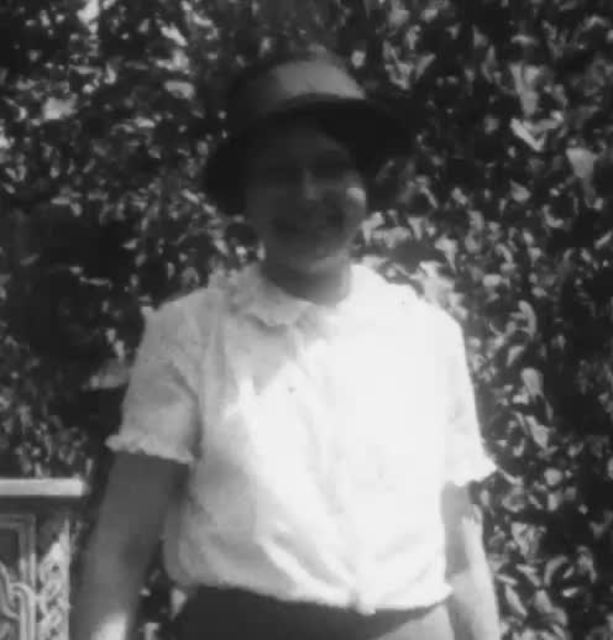
Emilie Herzstark
(Milka Herzstark)
Mar 04, 1908 - 1996Emilie "Milka" Herzstark (nee Wojnar); modiste; runs together with her husband the Kristall-Palast Kino at the Wiener Prater till the Anschluss in 1938. [According to Herzstark, Kein Geschenk für den Führer, 2005.]
-
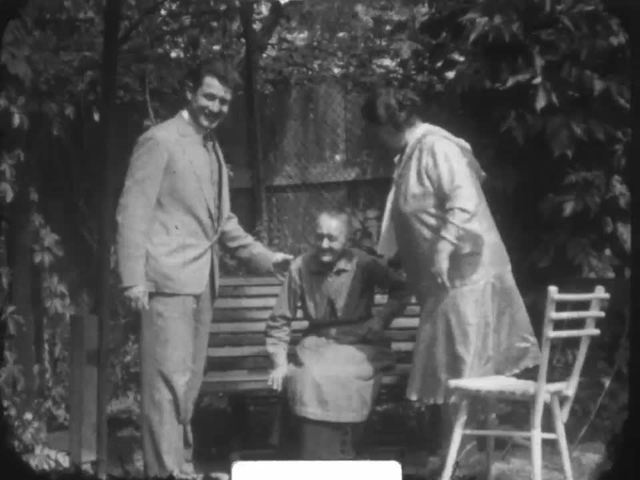
Curt Herzstark
(Kurt Herzstark)
Jan 26, 1902 - Oct 27, 1988Born in Vienna as a son of the calculator engineer Samuel Jakob Herzstark. 1916 after middle school apprenticeship as a precision mechanic Herzstark & Co. (Vienna) and the Astra-Werke (Chemnitz). 1925 company employee and by 1937 (death of the father) CEO of Herzstark & Co. 1939 patent issuance for the “Curta-Rechenmaschine”. 1943-07-28 arrested because of "relationships to German-blooded girls". 1943-10-29 deportation to Buchenwald; department head in the Gustloffwerke (precision engineering). 1945-05-02 leaves Buchenwald; returns to Vienna. 1946 moves to Liechtenstein; production of the “Curta-Rechenmaschine” by the Contina-AG. 1952 consultancy work for German and Italian office machines manufacturers. 1988 Curt Herzstark dies in Liechtenstein. [According to Herzstark, Kein Geschenk für den Führer, 2005.] ?
-
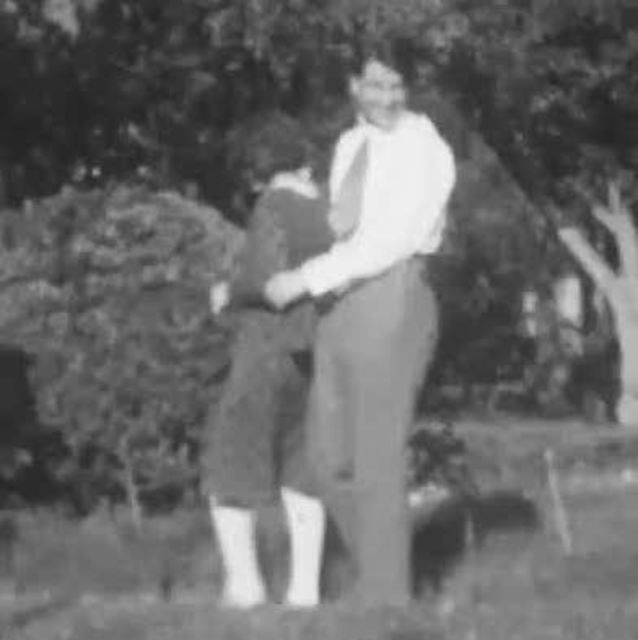
Ernst Herzstark
Apr 30, 1906 - 1992Born in Vienna as a son of the calculator engineer Samuel Jakob Herzstark. 1920 after middle school he starts an apprenticeship at Herzstark & Co; afterwards sale traineeship and company employee; shows little interest for his job; marries Emilie "Milka" Wojnar. 1932 - 1938 runs the Kristall-Palast-Kino at the Wiener Prater (Erste-Mai-Straße 40) which his father had bought in 1931. 1937 after the death of the father the cinema becomes property of the mother due to political circumstances 1945 cinema get destroyed during combat actions; after the war CEO at Herzstark & Co. [According to Herzstark, Kein Geschenk für den Führer, 2005.]
-
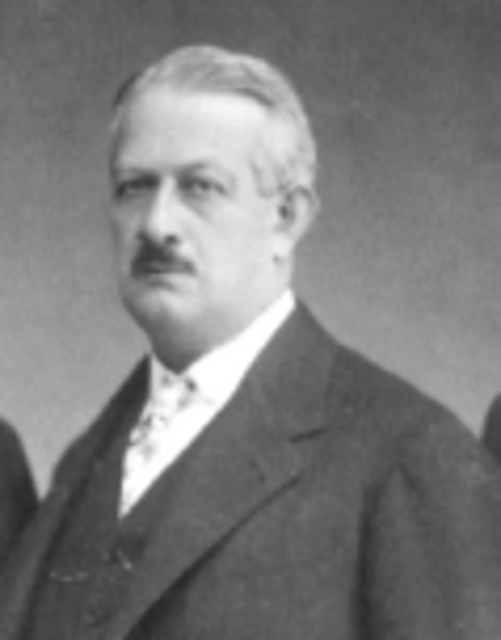
Samuel Jakob Herzstark
Oct 10, 1867 - Oct 24, 1937Born in Vienna as a son of Benjamin and Stefanie Herzstark; half-orphan (father dies early in the USA); merchant in engineering works; later on office machines industry. 1896/97 meets his eventual wife Marie Amalie Toman. 1906 co-founder, by 1915 sole holder of the company Rechenmaschinenwerk Austria, Herzstark & Co; produces i. a. his patented „Austria-Rechenmaschine”. 1918 cooperation with the company Mathias Bäuerle in St. Georgen (Baden-Wuerttemberg). 1931 purchase of the Kristall-Palast-Kinos at the Wiener Prater (Erste-Mai-Straße 40). 1933 “Goldenes Verdienstzeichen” of the Republic of Austria. 1937 Herzstark dies in Vienna; due to political circumstances his wife becomes sole heir; till the Anschluss in 1938 his sons Curt (Rechenmaschinenwerk) and Ernst (cinema) assume management of the respective firms. [According to Herzstark, Kein Geschenk für den Führer, 2005.] ?
-
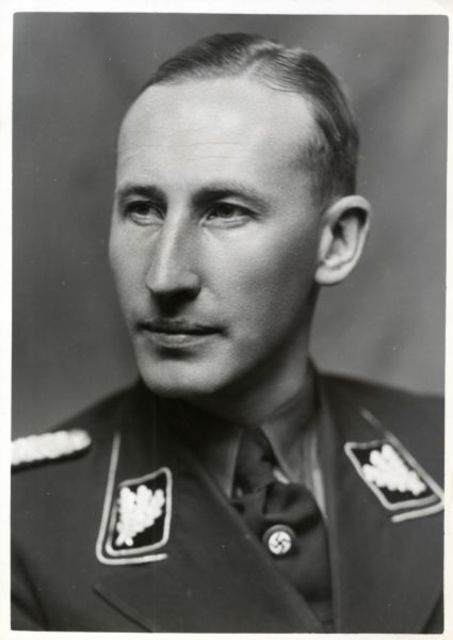
Reinhard Heydrich
(Reinhard Tristan Eugen Heydrich)
Mar 07, 1904 - Jun 04, 1942Head of the Reich Security Main Office (RSHA)
Born in Halle/Saale (Saxony-Anhalt) as a son of a composer. 1920 Freikorps Maercker. 1922 Abitur. 1922 - 1926 Receives navy training (1926 Lieutenant). 1926 - 1931 Navy-intelligence school. 1931 NSDAP; SS; fired from navy due to „ehrenwidriges Verhalten“ (dishonorable behavior) (reason: unredeemed engagement). 1931-07 Is assigned by Himmler to set up a SS secret service. 1932-07 Head of the Sicherheitsdienst (SD). 1933/34 Head of the political police (exception: Prussia). 1934 Participation in the Röhm-Affair. 1936 Head of the Sicherheitspolizei (Sipo), the SD and the Geheime Staatspolizei (Gestapo; former political police). 1938 Heydrich sends Adolf Eichmann to Vienna („Zentralstelle für jüdische Auswanderung in Wien“). 1939 Head of the Reichssicherheitshauptamt (RSHA; assosiaction of Gestapo, Kripo and SD). 1939/40 Heydrich monitors impoundment of Jew property and the deportations of Jews to polish Ghettos. 1941 Heydrich is assigned with the “Endlösung der Judenfrage“ (“final solution of the Jewish question”); deputy governor of the protectorate Bohemia and Moravia. 1942-01 Convocation of the Wannsee conference. 1942-05-27 Heydrich gets assassinated; dies a few days later in Prague because of his injuries. 1942-06-09 As vengeance for the assassination SS and police forces massacre inhabitants of the Czech village Lidice. [According to: Klee, Personenlexikon zum Dritten Reich, 2007; Deutsches Historisches Museum - online (2015).]
-
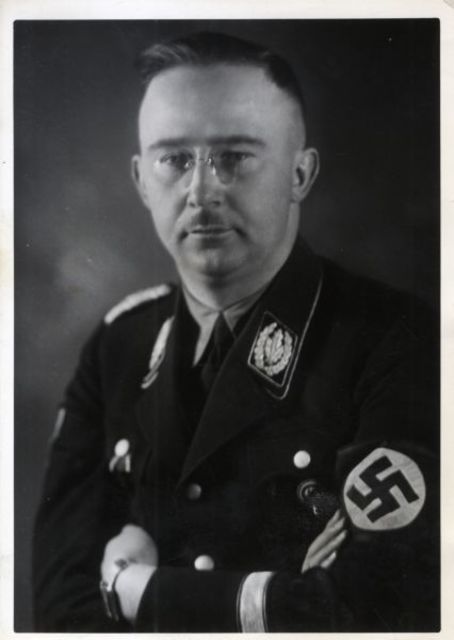
Heinrich Himmler
(Heinrich Luitpold Himmler)
Oct 07, 1900 - May 23, 1945Reichsführer-SS, Chief of the German Police, Reich Commissioner for the Preservation of German Nationality
Born in Lindau (Swabia) as a son of a head teacher. 1919 Takes part in the abolition of the Munich council republic as part of the Freikorps Lauterbach. 1919 - 1922 Studies agriculture at the Technische Hochschule München. 1923 Participation in Hitler’s coup in Munich 1925 Deputy Gauleiter Lower Bavaria - Upper Palatinate. 1926 Deputy Gauleiter of Upper Bavaria and Swabia. 1926 - 1930 Deputy Reichspropagandaleiter. 1927 Deputy Reichsführer-SS. 1929-01-06 Reichsführer-SS; beginning of the consistent setup and extension of the SS. 1933 Police president in Munich and police commander in Bavaria; founding of the concentration camp Dachau. 1934-04 Inspector of the Gestapo. 1934-06 Participation in the murder of Röhm. 1936-06 Head of the German police. 1939-10 Reich commissar for the consolidation of the German folklore (“Festigung des Deutschen Volkstums”); (relocation and prosecution policy in occupied territories). 1941 Man in charge for the “Endlösung“ (“Final Solution”). 1943 „Posener Rede“ (speech in Posen). 1943-08 Minister of Interior. 1944 Commander of the reserve army; man in charge for the detention of war captivities. 1945-01/02 Military failure as commander-in-chief of the Heeresgruppe Weichsel. 1945-03 Displacement as commander-in-chief of the Heeresgruppe; secret negotiations with the Western Allies concerning a separate peace. 1945-04 deposed from all offices; exclusion from the party; warrant. 1945-05 Rejected from the Reichsregierung under Karl Dönitz; flees under the pseudonym Heinrich Hitzinger; British war captivity; after exposure suicide in the prisoner camp Lüneberg. [According to: Klee, Personenlexikon zum Dritten Reich, 2007; Deutsches Historisches Museum - online (2015).]
-

Adolf Hitler
Apr 20, 1889 - Apr 30, 1945Fuehrer and Reich Chancellor, Supreme Commander of the Army
Born in Braunau/Inn (Upper Austria) as a son of a customs officer. 1905 Leaves middle school without graduation. 1907 Moves to Vienna; applies futilely for the art academy; casual labor. 1913-05 Evades compulsory military service by moving to Munich. 1914 - 1918 War volunteer in the Bavarian regiment. 1918/19 Representative and “Aufklärungsredner” (“enlightenment speaker”) of the Reichswehr. 1919-09 Deutsche Arbeiterpartei (DAP). 1919-10 Speaker of the DAP. 1920 Works on the party program of the NSDAP (former DAP); becomes the most important agitator of the party. 1921-07-29 Takes over party leadership. 1923-11-09 Hitler’s coup gets defeated; the day after party ban of the NSDAP; Hitler gets arrested. 1924-02 Sentenced to five years fortress detention by the Munich Volksgericht (“People’s Court”) because of high treason. 1924-12 Early prison release. 1925-02-27 Refounding of the NSDAP. 1925 Ban of speaking for Hitler. 1927/28 First speeches after repeal of the ban of speaking. 1931-10 Hitler talks out with Hindenburg; foundation of the Harzburger Front. 1932-02 Gains the German citizenship. 1932-04/06 Significant increase in votes in the President and Reichstag elections. 1933-01-30 Hindenburg appoints Hitler to be the Reichskanzler. 1933-03-05 NSDAP misses the absolute majority (ca. 43 percent). 1933-03-24 Adoption of the Ermächtigungsgesetz. 1934-06/07 Röhm-Affair. 1934-07-20 SS is placed directly under Hitler. 1934-08-02 Death of Hindenburg; Hitler unifies the posts of the president and the canceller („Führer und Reichskanzler“). The Reichswehr (by 1935 Wehrmacht) is inaugurated on Hitler. 1935-09-15 Adoption of the Nuremberg Racial Laws. 1936-03-07 Invasion of the Rhineland 1937-10-25 Mussolini in Berlin; Alliance „Axis Berlin Rom“. 1937-11-05 Hitler demands armament for offensive war from the Wehrmacht command. 1937-02-04 Supreme command of the Wehrmacht. 1938-03-15 Proclaims the “Anschluss” at the Viennese Heldenplatz. 1938-05-30 Secret Order to smash Czechoslovakia. 1938-11-09 Pogromnacht (initiated by Hitler and Goebbels). 1939-01-30 Hitler proclaims “Vernichtung der jüdischen Rasse in Europa” (“Destruction of the Jewish race in Europe”) in a speech at the Reichstag. 1939-03-15 Wehrmacht occupies Czechoslovakia. 1939-05-23 Explains his war plans to the command of the Wehrmacht; claims “Lebensraum im Osten” (“living space in the east”). 1939-08-23 Hitler-Stalin-Pact. 1939-09-01 Invasion in Poland. 1940-07-31 Signs with Führer’s directive the invasion of the Soviet Union (“Operation Barbarossa”). 1944-07-20 Failed assassination attempt on Hitler. 1944-09-25 Mandates the formation of the “Volkssturm”. 1945-01-30 Conjures up the “Endsieg” in his last radio speech. 1945-04-29 Marriage with Eva Braun. 1945 Suicide in the Führerbunker. [According to: Deutsches Historisches Museum - online (2015).]
-
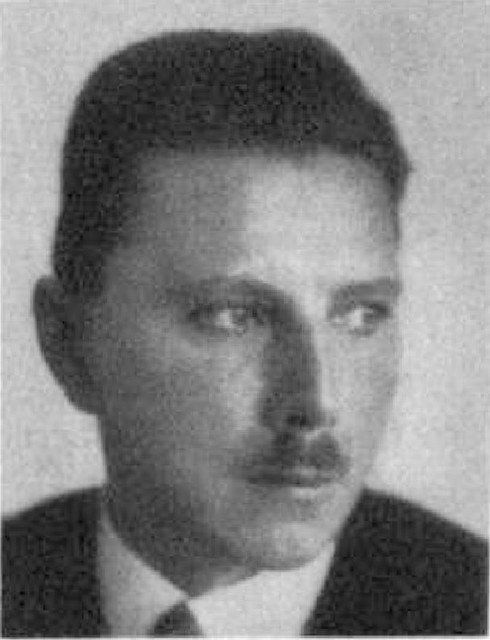
Franz Hueber
Jan 10, 1894 - Jul 10, 1981Federal Minister of Justice
Born in Grünburg (Upper Austria). 1912 - 1918 Studies Law at the University of Vienna (1918 Dr. iur.). 1914 -1918 Participation in World War I. 1919 Notaryship aspirant in Saalfelden; co-founder of the Heimwehr Pinzgau. 1920 Marriage with Paula Görings. 1925 Second Landesführer of the Heimwehr Pinzgau. 1927/28 Notary in Mattsee. 1930 - 1932 Member of the Nationalrat; party whip of the Heimatblock. 1930-09-30 - 1932-12-04 Minister of Justice in the Cabinet Vaugoin. 1933/34 Resignation from the Heimwehr; joins the National Socialists. 1937 Notary in Wels. 1938-03-11 Minister of Justice of the temporary government Seyß-Inquart. 1938 - 1945 Member of the Reichstag. 1939-05 Minister of state and agent of the Minister of Justice in Austria; undersecretary of state in the Ministry for Justice. 1942/43 President of the Reichsverwaltungsgericht (administrative court). 1945 - 1947 Camp imprisonment. 1948 Sentenced to 18 years of incarceration because of high treason. 1950-12 Released on probation; works till 1962 as a merchant. 1981 Hueber dies in Salzburg. [According to: Klee, Personenlexikon zum Dritten Reich, 2007; Slapnicka, Oberösterreich - Die politische Führungsschicht, 1976.]
-
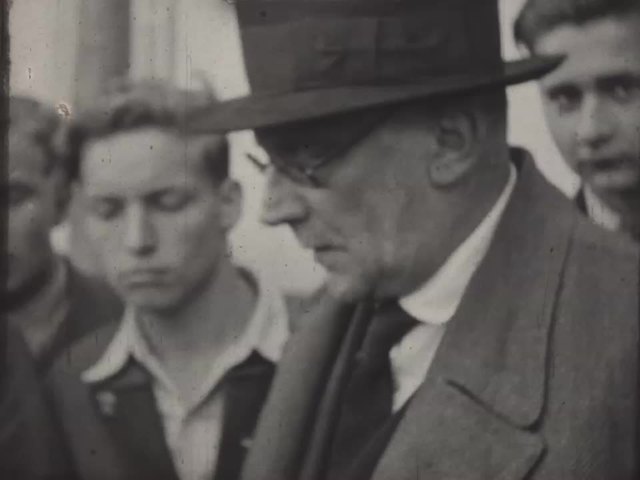
[...] Hübel
-
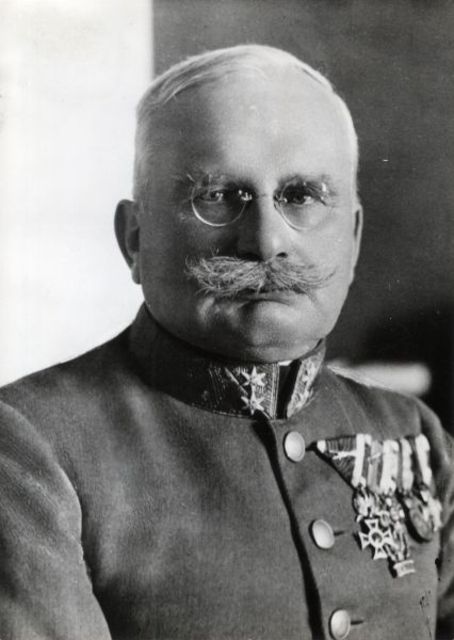
Ludwig Hülgerth
Jan 26, 1875 - Aug 13, 1939Born in Vienna as a son of a major 1893 Feldjägerbataillon in Villach 1914 Landwehrregiment in Klagenfurt; captain 1914-1918 Participant in World War I; lieutenant-colonel 1918/19 chief commander of a police force; commander of the Kärntner Volkswehr; military leader in the Carinthian defense 1923 colonel 1927 retirement as a general; turns towards politics 1934-03-07 - 1936-11-03 governor of Carinthia 1936 commander of the militia of the Vaterländische Front 1936-11-03 - 1938-03-11 vice chancellor in the Schuschnigg administration 1939 Hülgerth dies at Schloss Rottenstein near St. Georgen am Längsee (Carinthia) [According to Österreichisches Biographisches Lexikon - Online Edition (2015).]
-
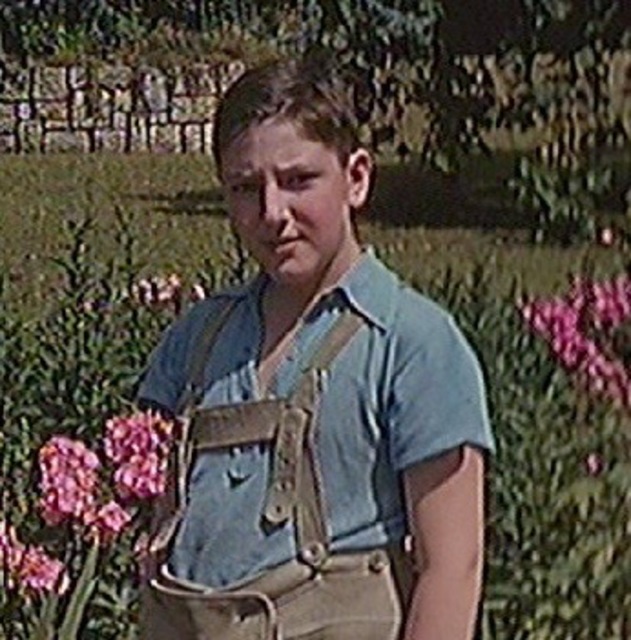
Alexander Illich
(Sascha Illich)
Nov 30, 1928 - Jun 20, 2009Born in Vienna as a son of Ellen (born Regenstreif) und Peter Illich; lives together with his parents and siblings near Split (Yugoslavia). 1932 Because of political tensions his mother returns together with Michael and his two brothers to Vienna where they live together in Friedrich Regenstreif’s (his grandfather) mansion; his father stays in Yugoslavia. 1934-06-22 Death of the grandmother Johanna (born Ortlieb) Regenstreif. 1941-05-08 Death of the grandfather Friedrich Regenstreif. 1941-06-07 The family mansion is sold under pressure to the Deutsche Arbeitsfront (DAF); Alexander lives together with his mother and his two brothers in the guesthouse Scheidl in Vienna. 1942-07-11 Alexander and his brothers get excluded from school as they are told in their year reports that they are „Mischlinge 1. Grades”. 1942-07-18 Death of the father in Croatia. 1942-09-12 Michael’s mother who is considered a “Volljüdin” due to the Nuremberg Laws flees together with her sons to Split (arrival: 1942-09-29). 1943-01-14 Onward journey of the family to Florence; Alexander studies architecture there. 1949 Moves to Milwaukee; works there as an architect. 1951 - 1953 U.S. Army Corps of Engineers; later again architect in the USA and Europe. 2007 His book "Our Pötz: Pictures of my Grandfathers Villa in Pötzleinsdorf" gets published. 2009 Illich dies in Nantucket (Massachusetts).
-
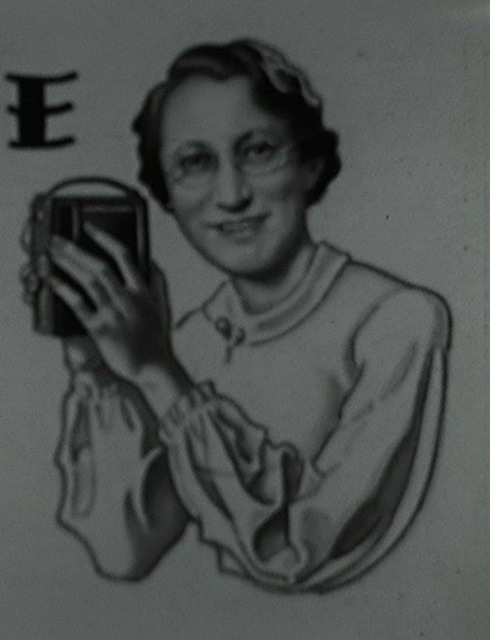
Ellen Illich
(Ellen Rose "Maexie" Regenstreif)
Apr 21, 1901 - Mar 14, 1965Ellen (Maexie) Regenstreif Illich (1901-1965) came from a family of converted Sephardic Jews who had settled in Germany. Her industrialist father, Fritz (Pucki) Regenstreif (1868-1941), had a lumber business in Bosnia where he owned a sawmill at Zavidovic. He also owned an Art Nouveau villa on the outskirts of Vienna in Pötzleinsdorf built by Friedrich Ohmann. Piero Ilic (1890-1942) came from a landed family in Dalmatia, Yugoslavia with property in Split and extensive wine and olive oil producing estates on the island of Brac. Ellen and Piero married in 1925 and established a home in Split. There was a resurgence of anti-foreign and anti-Jewish sentiment in Yugoslavia and the Yugoslav government made claims against her father as a landowner in Bosnia at the International Court in the Hague, so in 1932, Ellen returned to her father's villa in Vienna with their three children: Ivan (1926-2002), Michael (Micha) (b. 1928), and Alexander (Sascha) (1928-2009). The boys never saw their father again; Piero died of natural causes in Split in July 1942. After the death of Ellen's father on May 8, 1941 and the forced sale of his splendid home to the Nazis in 1942, Ellen moved with the children to Florence, Italy by way of Split, where they lived for three months. In Nazi Austria, Ellen was considered an ethnic Jew although she was a baptized Christian, and the children were classified as half-Jewish. The family films were kept in a wooden cabinet in the basement of Sascha's New York home from 1961 to 2006, when they were preserved by the United States Holocaust Memorial Museum.
-
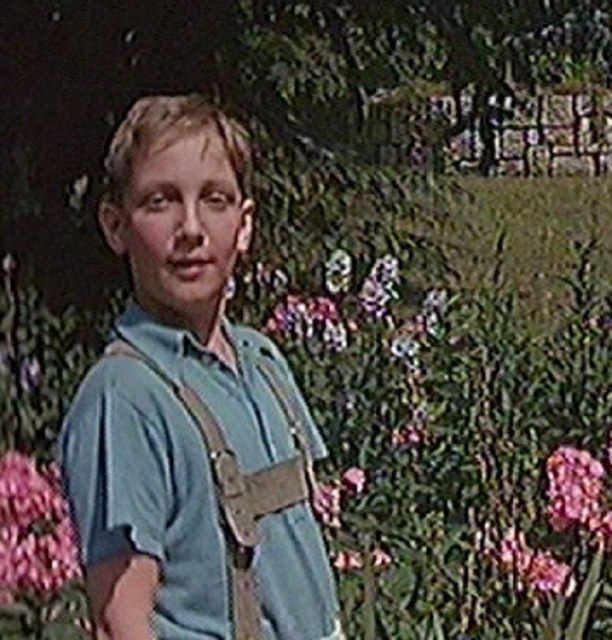
Michael Illich
(Micha Illich)
Nov 30, 1928Born in Vienna as a son of Ellen (born Regenstreif) and Peter Illich; lives together with his parents and siblings near Split (Yugoslavia). 1932 Because of political tensions his mother returns together with Michael and his two brothers to Vienna where they live together in Friedrich Regenstreif’s (his grandfather) mansion; his father stays in Yugoslavia. 1934-06-22 Death of the grandmother Johanna (born Ortlieb) Regenstreif. 1941-05-08 Death of the grandfather Friedrich Regenstreif. 1941-06-07 The family mansion is sold under pressure to the Deutsche Arbeitsfront (DAF); Michael lives together with his mother and his two brothers in the guesthouse Scheidl in Vienna. 1942-07-11 Michael and his brothers get excluded from school as they are told in their year reports that they are „Mischlinge 1. Grades”. 1942-07-18 Death of the father in Croatia. 1942-09-12 Michael’s mother who is considered a “Volljüdin” due to the Nuremberg Laws flees together with her sons to Split (arrival: 1942-09-29). 1943-01-14 Onward journey of the family to Florence; later USA. ?
-
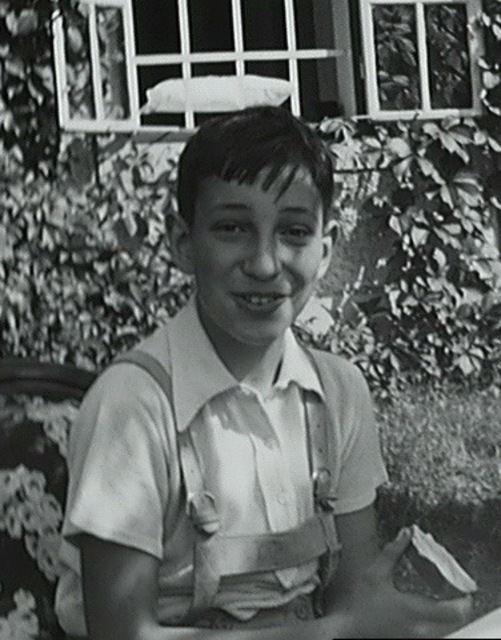
Ivan Illich
(Ivan Dominic "Dinko" Illich)
Sep 04, 1926 - Dec 0, 2002Ivan Illich was an Austrian philosopher, Roman Catholic priest, and social critic of the institutions of contemporary Western culture. He was the first son of Ellen Regenstreif and Piero Ilic, born in Croatia in 1926. Ivan lived in his grandfather's villa in Vienna with his twin brothers, Michael and Alexander, and his mother. After the death of Ivan's grandfather on May 8, 1941 and the forced sale of his splendid home to the Nazis in 1942, Ellen moved with the children to Florence, Italy by way of Split, where they lived for three months. Later, he split his time between the United States, Mexico, and Germany.
-
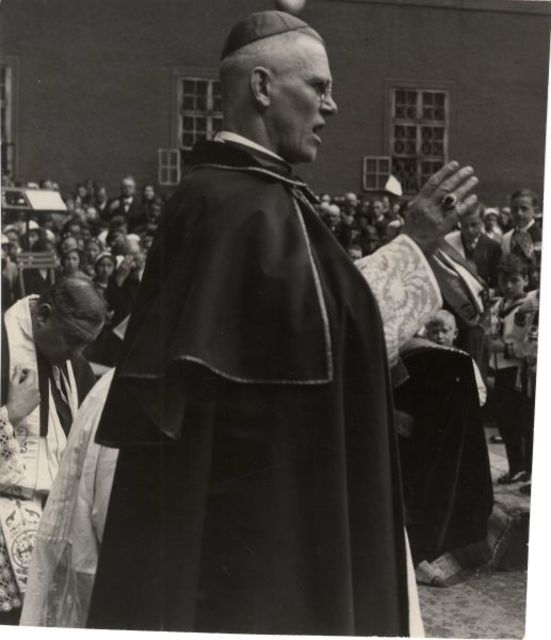
Theodor Innitzer
Dec 25, 1875 - Oct 09, 1955Born in Neugeschrei (today: Nove Zvolani, Czech Republic) as a son of a factory employee 1898 graduation at the Gymnasium (high school) in Kaaden; later study of theology at the University of Vienna (1906 Dr. theol.) 1902 ordination to the priesthood 1908 habilitation 1911 Professor for New Testament exegesis 1928/29 principal of the University of Vienna 1929-09-26 - 1930-09-25 minister for social service in the Schober administration 1932 – 1955 archbishop of Vienna 1933 cardinal Innitzer supports the austro-fascist regime of Dollfuß and Schuschnigg 1938-03-18 together with other Austrian bishops he signs an appeal to vote with YES at the plebiscite 1940 foundation of the Erzbischöfliche Hilfsstelle für nichtarische Katholiken (archiepiscopal aid center for non-Aryan Catholics) [According to Neue Deutsche Biographie, Bd. 10, Berlin 1974; Weißensteiner, Theodor Innitzer, Göttingen 2015.]
-
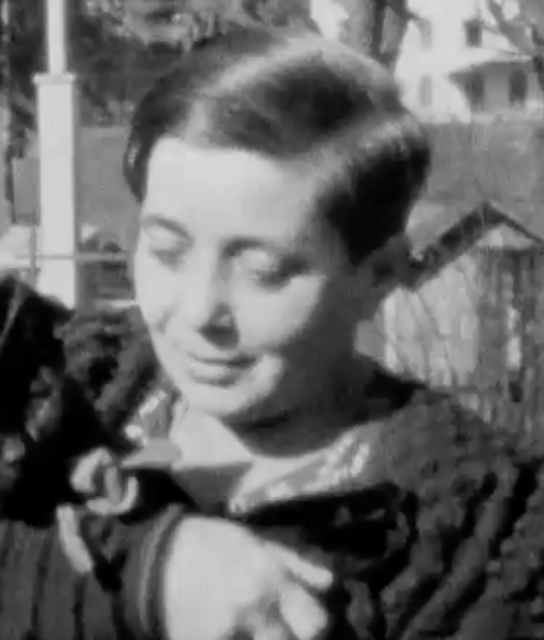
Emilie Janzekovic
Mar 11, 1894 - 1963Born in Raab (Upper Austria) as a daughter of Anton and Oranka Ifenz (nee Maesary) 1919-11-20 marriage with Franz Janzekovic, Ehe remains childless 1935 purchase of a house on Hauptstraße 128 in Hadersdof-Weidlingau (Lower Austria; by 1938-05 Vienna); purchase is equally shared with her husband Franz 1948 disposal of the house and move to Klosterneuburg, Untere Öden 79 1952 death of her husband 1954 move to Vienna, Ottakring 1963 Emilie Janzekovic dies in Vienna [According to Pfeiffer, Forschungsbericht Filmanalyse „HaWai“, Seminararbeit bei Prof. S. Mattl, Univ. Wien, o. J. (2008/09).]
-

Franz Janzekovic
Nov 28, 1885 - May 03, 1952Born in Pettau (Styria, today: Ptuj, Slovenia) as a son of Andreas and Agnes Janzekovic (nee Maieritsch) 1919-11-20 marriage with Emilie Maesary, marriage remains childless; works as a hotel manager 1935 1935 purchase of a house on Hauptstraße 128 in Hadersdof-Weidlingau (Lower Austria; by 1938-05 Vienna); purchase is equally shared with his wife Emilie 1948 disposal of the house and move to Klosterneuburg, Untere Öden 79 1952 Franz Janzekovic dies in Klosterneuburg [According to Pfeiffer, Forschungsbericht Filmanalyse „HaWai“, Seminararbeit bei Prof. S. Mattl, Univ. Wien, o. J. (2008/09).]
-
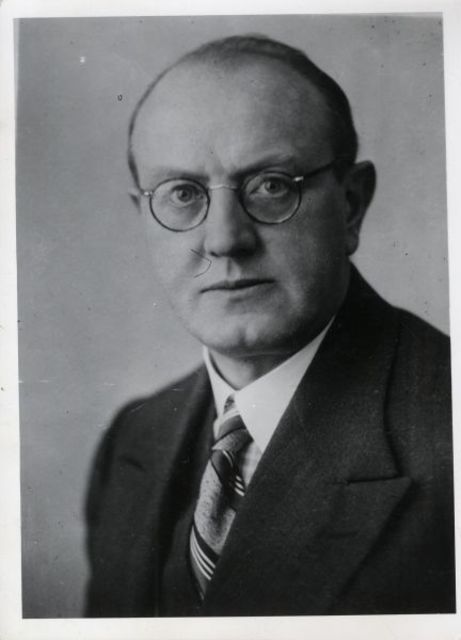
Hugo Jury
Jul 13, 1887 - May 08, 1945Born in Mährisch-Rothmühl (Moravska Radimer, Czech Republic) as a son of a teacher. 1905 - 1911 Studies medicine at the University of Prague (1911 Dr. med.). 1905 Member of the fraternity Ghibellinia. 1908 One-year volunteer. 1913 - 1919 Community Physician in Frankenfels (Lower Austria). During World War I physician in the k.u.k army. 1919 Doctor’s office in St. Pölten (Lower Austria); participates in the Lower Austrian Heimwehr. 1931 NSDAP. 1932/33 Floor leader of the Nazi councilmen in St. Pölten. NS-activities despite party ban (1933): several times arrested. 1936 - 1938 Deputy Landesleiter of the illegal NSDAP. 1938-02 Appointed in the Staatsrat by Schuschnigg. 1938-03-11 Short-term Minister for Social Administration under unter Seyß-Inquart. 1938-03 SS-Sturmbannführer. 1938-04 Member of the Reichstages. 1938-05-24 Gauleiter Niederdonau. 1939-03 Head of the Parteiverbindungsstelle in the Reichsprotektorat Bohemia and Moravia. 1940 Reichsstatthalter and by 1942 Reich defense commissar for Niederdonau. 1943 SS-Obergruppenführer. 1943/44 Contemplated a few times as Gauleiter of Vienna. 1945 Suicide in Zwettl (Niederdonau). [According to: Österreichisches Biographisches Lexikon - Online Edition (2015).]
-
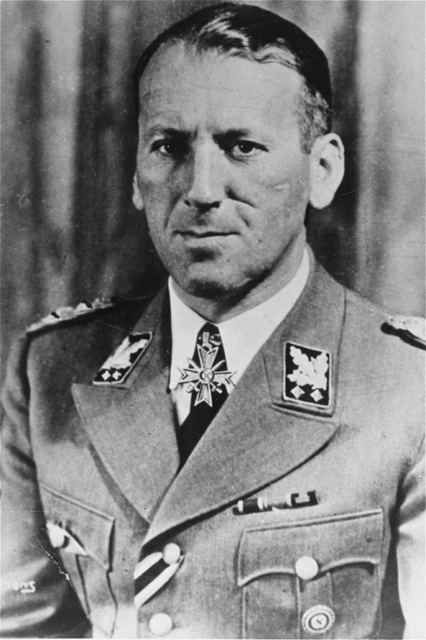
Ernst Kaltenbrunner
Oct 04, 1903 - Oct 16, 1946SS and Police Leader, Chief of the Security Police and Security Service
Born in Ried/Innkreis as a son of an advocate. 1918-1922 Gymnasium (high school) in Linz; meets Adolf Eichmann 1921-1923 chemistry studies at the University of Graz; fraternity Arminia, changes studies 1923-1928 studies law (1928 Dr. iur.) 1926-1928 internships in Linz and Salzburg 1929 advocate in Linz; Heimwehr 1930-10 NSDAP 1931-08 SS 1932 switches to his father’s law firm; provides free attorney to the Nazis 1933-1935 is imprisoned twice because of illegal Nazi activities (1933-06 NSDAP ban in Austria); employment ban 1936-1938 works primarily for the SS 1937-01 head of the Austrian SS 1938-03 state secretary for public safety in the Seyß-Inquart administration; member of the Reichstag 1938-09 - 1943-01 higher SS- and police leader in the section Danube and Vienna; in this capacity responsible for the Geheime Staatspolizei (Gestapo), SS, Polizei- and Sicherheitsdienst (SD). 1938/39 organization Gestapo Austria, setup of the KZ Mauthausen 1940-06 - 1941-01 superintendent of Vienna 1941 SS Gruppenführer 1943-01 successor of Reinhard Heydrich as head of the Sicherheitspolizei and the SD, head of the Reichssicherheitshauptamt (RHSA); in this capacity boss of Adolf Eichmann 1943-06 SS Obergruppenführer and general of the police force 1945 tries to negotiate a separate peace with the western Allies 1945-05-12 detention near Altaussee by American troops 1946-10-01 is sentenced to death in Nuremberg because of crimes against humanity; execution in Nuremberg [According to Klee, Personenlexikon zum Dritten Reich, 2007; Deutsches Historisches Museum - online (2015).]
-
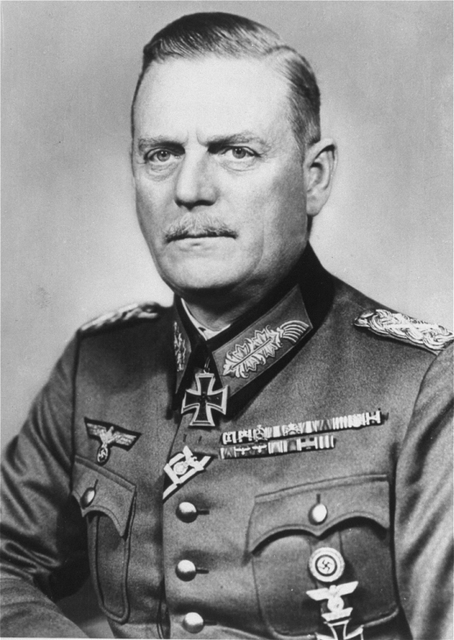
Wilhelm Keitel
(Wilhelm Bodewin Johann Gustav Keitel)
Sep 22, 1882 - Oct 16, 1946Born in Helmscherode (Lower Saxony) as a son of a landowner 1901 after graduation (Abitur) Cadet in an artillery regiment 1914 Western front 1915 general staff 1917 commander in Flanders 1919 serves in the Reichswehr; captain 1925-1927 group leader in the Truppenamt of the ministry of war 1927-1929 commander of an artillery regiment 1929-1933 head of the Heeres-Organisationsabteilung in the Truppenamt 1935 head of the Wehrmachtamt in the ministry of war 1937 general 1938 Keitel becomes head of the Oberkommando of the Wehrmacht as a result of the Blomberg-Fritsch-Crisis 1940-07-10 field marshal 1941-09-16 Keitel gives the Geisel-Sühne-Befehl (hostage-atonement-order) 1941-12-07 Nacht-und-Nebel-Erlass (night-and-fog-order) 1945-05-09 commissioned by Karl Dönitz he signs the unconditional surrender of the Wehrmacht against the Red Army 1945-05-13 war captivity 1946-10-01 is sentenced to death in Nuremberg because of crimes against humanity 1946 execution in Nuremberg [According to Klee, Personenlexikon zum Dritten Reich, 2007; Deutsches Historisches Museum - online (2015).]
-
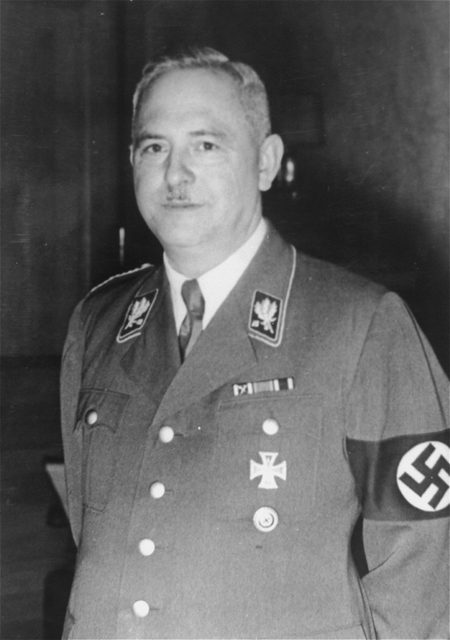
Hanns Kerrl
Dec 11, 1887 - Dec 15, 1941Born in Fallersleben (Lower Saxony) as a son of a headmaster. After graduation (Abitur) professional career as judicial officer 1914-1918 Participation in World War I 1923 NSDAP 1928-1933 Prussian MP 1933 member and vice-president of the Reichsrat 1933-04 - 1934-06 Prussian minister of justice 1933-1941 member of the Reichtag, SA 1933-1935 Reich Commissioner of the Prussian ministry of justice 1934-06-22 minister without portfolio 1935 minister for clerical issues (Gleichschaltung – cooptation – of churches); head of the Reichsstelle Raumordnung (regional development) 1941 Kerrl dies due to a heart disease in Paris [Accoring to Klee, Personenlexikon zum Dritten Reich, 2007; Neue Deutsche Biographie, Bd. 11. Berlin 1977.]
-
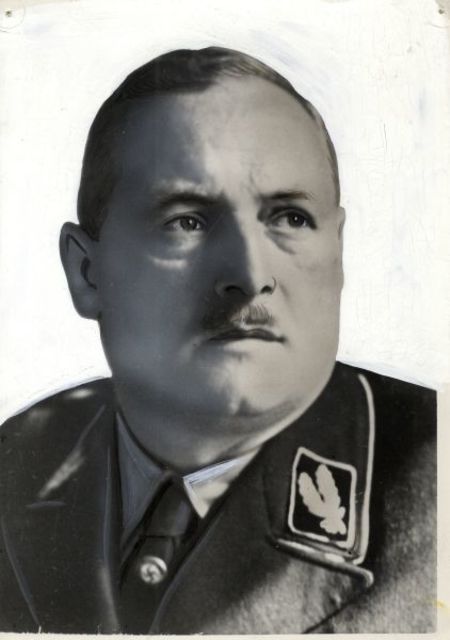
Hubert Klausner
Nov 01, 1892 - Feb 12, 1939Born in Raibl (today Italy) as a son of a k.u.k fiscal 1912 graduation (Matura) 1913 reserve officer school 1914-1918 participation in World War I 1919-1920 commander of a Volkswehrbataillon in the Carinthian defense. 1920 Austrian Armed Forces (Bundesheer) 1922 NSDAP 1933 Gauleiter of the banned NSDAP in Carinthia 1933 and during 1935-1937 multiple times arrested because of illegal NS-activities (1933-06 NSDAP ban in Austria) 1938-02 in consequence of the Berchtesgadener Abkommen Hitler appoints Klausner Landesleiter of Austria 1938-03-13 - 1938-05-24 minister for political decision-making in the Seyß-Inquart administration 1938-04 member of the Reichstag 1938-05-24 - 1938-02-12 deputy of the Reich Governor; minister of the interior 1938-05-27 Gauleiter and (nominal) governor of Carinthia 1939 Klausner dies unexpected from a stroke in Vienna [According to Österreichisches Biographisches Lexikon - Online Edition (2015).]
-
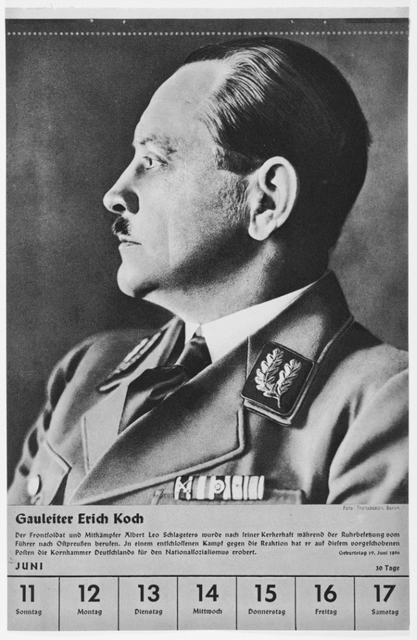
Erich Koch
Jun 19, 1896 - Nov 12, 1986Born in Elberfeld (Rhineland; today Wuppertal) as a son of a foreman. Apprenticeship as a merchant, later railroad official 1915-1918 Participation in World War I; joins the Upper Silesian Freikorps after the end of the war 1921 NSDAP 1928-09 Gauleiter of East Prussia 1933 Foundation of the Erich-Koch-foundation 1933-1945 governor of East Prussia; member of the Reichstag 1938 SA Obergruppenführer 1939 commissioner of defense of East Prussia 1941 head of the civil administration of the district Bialystok; Reich commissioner of the Reichskommissariat Ukraine 1944 head of the Volkssturm in East Prussia 1945-04 flight under the pseudonym Rolf Berger 1949-05 exposure and detention by the British military police 1950-01 extradition to Poland 1957 in Warsaw he is sentenced to death because of complicity in murder and war crimes 1959 execution is suspended due to disease and eventually changed to life imprisonment in 1960 1986 Koch dies in Polish imprisonment [According to Klee, Personenlexikon zum Dritten Reich, 2007; Meindl, Ostpreußens Gauleiter, 2007.]
-
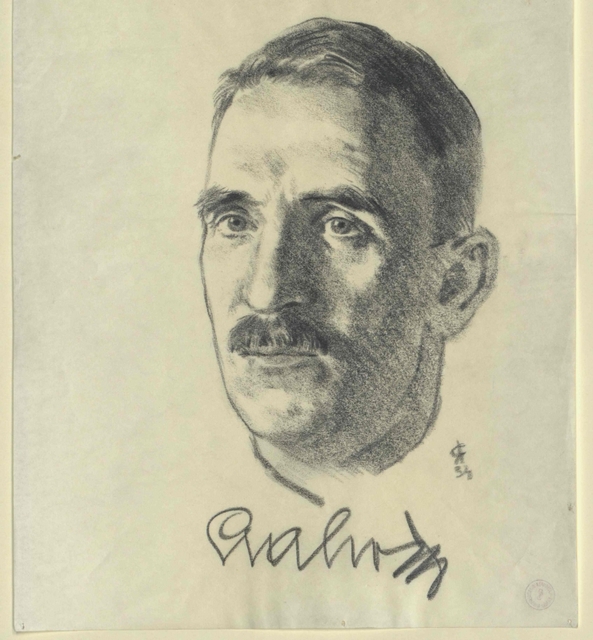
Fritz Lahr
(Friedrich Lahr)
May 12, 1890 - Mar 27, 1953Born in Salzburg 1911 graduation at the Theresian Military Academy 1914-1918 participation in World War I; commander of a field artillery regiment 1927 Landesführer deputy of the Wiener Heimatschutz (under Emil Fey) 1934 federal consultant for paramilitary sports; is considered a contact man to the banned National Socialists 1934-02 Lahr organizes the Wehrsturm of the Heimatschutz against the social democratic Schutzbund during the February uprisings 1934-04 - 1938-03 vice-mayor of Vienna under Richard Schmitz 1938-03-11 - 1938-03-13 acting mayor of Vienna; enables SA troops to get in the town hall; cultivates contacts to Thomas Kozich 1940-1945 air force of the Wehrmacht [According to Czeike, Historisches Lexikon Wien, 1992-2004; Botz, Nationalsozialismus in Wien, 2008.]
-

Adolf Mayer
(Adi)
May 14, 1908 - Dec 12, 1960Cameraman
Born in Vienna as a son of the Austrian film pioneer Gustav Mayer and his wife Margaretha; brother of Rudolf Mayer (1903). 1936 death of the father; the company is demised to the mother; Adolf takes over the management; 1938 renaming of the company to “Adi Mayer’s Filmbüro” (advertising and culture films)’ additionally Adolf Mayer works as a cameraman for the “Deutsche Wochenschau” 1941 area manager of the “Deutsche Wochenschau” for Vienna; after end of the war the company specializes on the production of advertising films. 1960 Adi Mayer dies in Vienna; the company remains family property and is today (2015) Austria’s biggest advertising film producer. [According to adimayerfilm.at (2015).]
-

Rudolf Mayer
1903 - 1962Cameraman
Born in Vienna as a son of Gustav Mayer, a pioneer of Austrian film newsreels; brother of Adolf “Adi” Mayer.
-
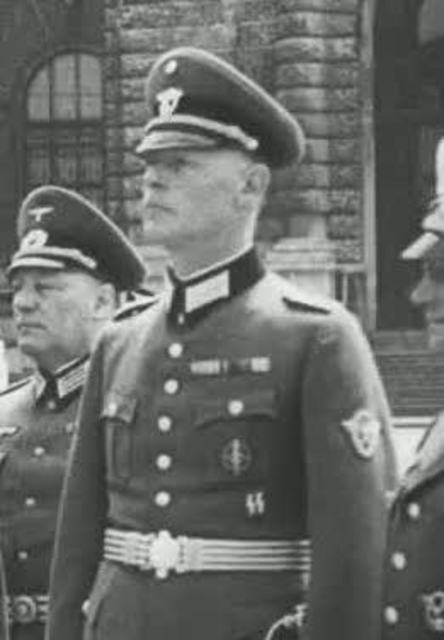
August Meyszner
(August Edler von Meyszner)
Aug 03, 1886 - Jan 24, 1947Born in Graz (Styria) as a son of a senior lieutenant. Attendance of the cadet school Vienna. 1914 police service 1914-1918 participation in World War I; commander at the Italian front; after end of the war again police service 1919 had of the Styrian Heimatschutz 1925 NSDAP 1930 MP of the Heimatblock in the Styrian state parliament (Landtag); Landesrat of the Styrian government 1933 Meyszner is deprived of all of his political functions due to illegal NS and Heimatschutz activities; mandatory retirement (NSDAP ban of 1933-06 includes also the Styrian Heimatschutz); deputy SS Brigadenführer central Styria 1934-02 several months of imprisonment due to ongoing NS activities (detention camp: Wöllersdorf); after release SA Brigadenführer central Styria; police puts up “wanted” posters of him; flight to Yugoslavia and Germany; joins the Schutzpolizei Berlin 1935 SS. 1935-05 German citizenship 1937 voluntary judge at the Volksgerichthof 1938 NSDAP (reentry); member of the Reichstag 1938-04-12 commissarial Chief of Staff of the Ordnungspolizei in Austria (Marschgruppe I) located in Vienna; controversies with Ernst Kaltenbrunner 1938/39 Chief of Staff of the Ordnungspolizei Sudetenland 1939/40 Chief of Staff of the Ordnungspolizei Kassel 1940/41 commander in chief of the Ordnungspolizei Norway 1941 lieutenant general of the police and SS Gruppenführer 1942-1944 higher police and SS Gruppenführer Serbia 1945 extradition to Yugoslavia 1946-12-22 Meyszner is sentenced to death by the highest military court in Belgrade; the execution takes place in Belgrade [According to Klee, Personenlexikon zum Dritten Reich, 2007; Moll, Vom österreichischen Gendarmerie-Offizier zum Höheren SS- und Polizeiführer Serbien, 2011.]
-
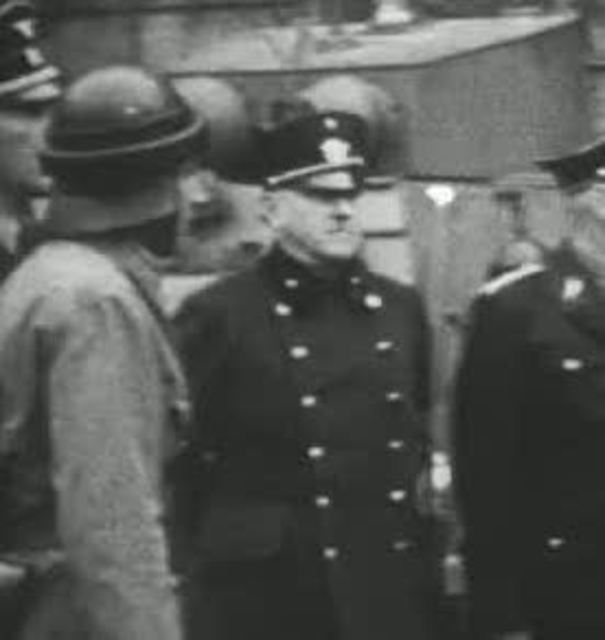
Emil Michall
18811906 one year volunteer 1908-12 police officer 1910 area controller 1917-12 high police commissioner 1938-01 head of the Sicherheits- and Verkehrdienst of the general inspectorate of the Bundessicherheitswache 1938-09 deputy commander of the Viennese Schutzpolizei [According to Neues Wiener Tagblatt, 1906-12-31, 8 / 1938-01-16, 8 / 1938-09-28, 10; Neuigkeits-Weltblatt, 1908-12-31, 15; Neues Wiener Journal, 1917 -12-16, 8.]
-
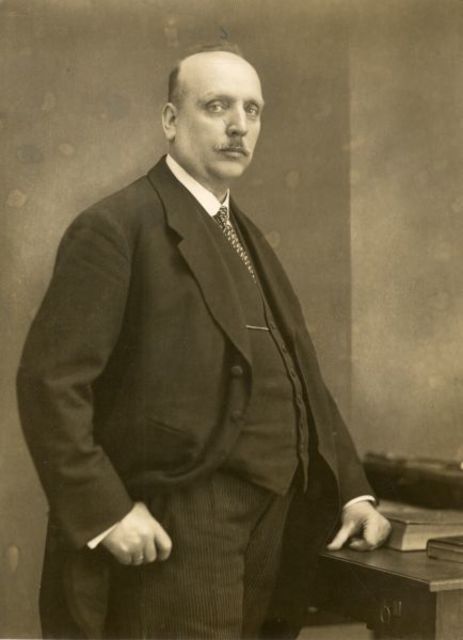
Wilhelm Miklas
Oct 15, 1872 - Mar 20, 1956Born in Krems/Danube (Lower Austria) as a son of a postal clerk; attendance of the Stiftsgymnasium (high school) in Seitenstetten. 1890-1895 studies History, Germanistics and Geography at the University of Vienna (1895 Dr. phil.); teaching qualification; goes into teaching 1907-1918 MP of the Christian Social Party 1908 member of the Lower Austrian parliament 1919-1920 undersecretary of state for cultural affairs for the government office of Interior and Education. 1918/1919 member of the provisory and the constituted National Assembly 1919-1928 member of the National Assembly (1923-1928 presiding officer of Austrian parliament) 1928-1934 President of the Austrian Republic 1934-1938 President of the Federal State Austria 1938-03-11 after being put under heavy pressure he appoints Arthur Seyß-Inquart as chancellor 1938-03-13 reclines official duties; evades the signing of the “Anschlussgesetz” 1956 Miklas dies in Vienna [According to Neue deutsche Biographie, Bd. 17, Berlin, 1994.]
-
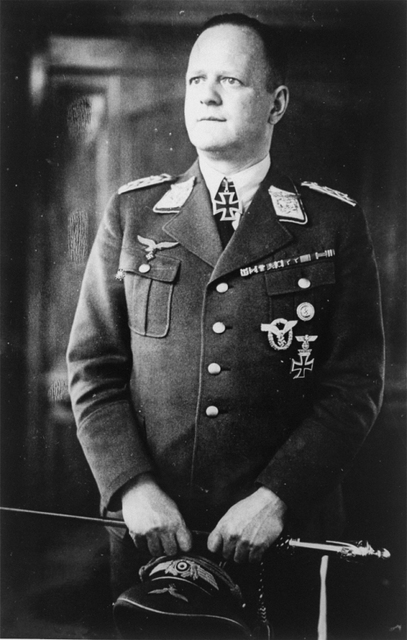
Erhard Milch
Mar 30, 1892 - Jan 25, 1972Field marshal
Born in Wilhelmshafen (Lower Saxony) as a son of an (alleged Jewish) navy pharmacist. 1910 graduation from high school; Officer Cadet of Dismounted Artillery 1914-1918 participation in World War I; Dismounted Artillery; later on Imperial German Air Army Service 1926 board member and in 1928 consultant of the German Lufthansa 1933 NSDAP; is appointed by Göring secretary of state in the Ministry of aviation and is assigned with the setup of the air force 1939 Inspector General of the air force 1940 field marshal 1941 Chief of Aircraft Procurement and Supply (armament development); holding this position he is responsible for human experiments conducted in the concentration camp Dachau 1943 due to military failures of the air force: loss of political importance 1944-07/08 disempowerment 1945-01 deposed of all of his positions 1945 imprisonment and British war captivity 1947-04-17 is sentenced to life imprisonment in Nuremberg 1951-01 sentence is reduced to 15 years in prison 1954-06-28 is released from prison earlier in Landsberg; later on consultant for the aviation industry 1972 Milch dies in Wuppertal (North Rhine-Westphalia) [According to Klee, Personenlexikon zum Dritten Reich, 2007; Neue Deutsche Biographie, Bd. 17, 1994.]
-

Lafayette P. Monson
1902 - 1968Cameraman
On July 4, 1938, San Francisco physician, Dr. Lafayette P. Monson arrived from New York to Southampton, England on board the Normandie ship. He traveled the world and recorded sights with 16mm Kodachrome film. The color motion pictures show Rome, Venice, Vienna, Budapest, Belgrade, Bucharest, Sofia, and Istanbul. Monson returned to California on the Pan American Airways Philippine Clipper which departed from Manila, Philippines on October 8, 1938. Monson toured the world after his wife, Margaret, died of pneumonia, on December 26, 1937. They had two children, Elizabeth and Joanne, and were Mormon. Monson was born in Preston, Idaho and lived in Salt Lake City, Utah and Carson City, Nevada prior to living in California.
-
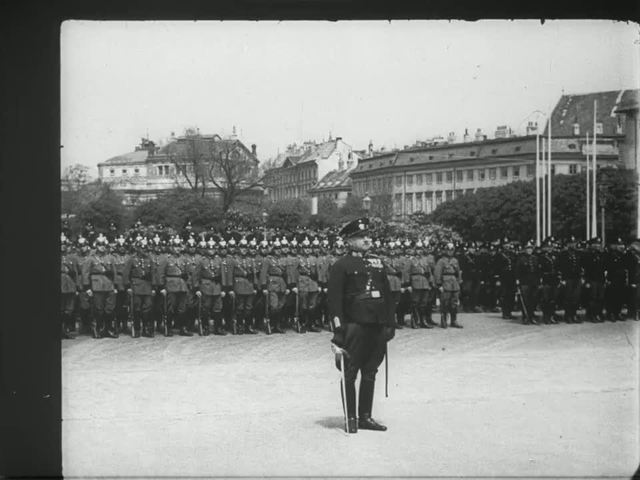
[...] Musil
-
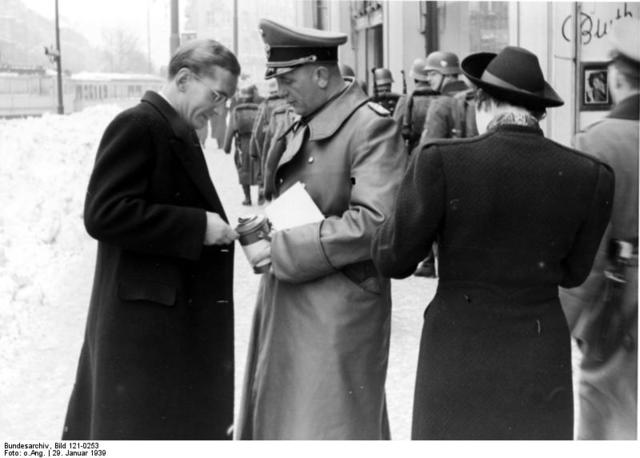
Arthur Mülverstedt
Jun 30, 1894 - Aug 10, 1941Born in Gebesee (Thuringia) as a son of a farmer. 1914 Abitur. 1914-1918 Participation in World War I; after end of war Sicherheitspolizei Wien; later commander of the Landespolizei Hanover. 1932 NSDAP. 1936 Vize-Generalinspekteur. 1937-04 Gernalinspekteur of the Schutzpolizei of the Reich in Hauptamt Ordnungspolizei. 1938 SS-Oberführer. 1940 SS-Gruppenführer. Since 1938 Managing police officer in the “Ostmark” and Sudentenland. 1939 Is assigned to conduct the “Säuberung” (cleansing) of Bromberg (pol. Bydgoszcz); commander of Polizeigruppe 5. 1940-11 – 1941-08 Commander of SS-Polizeidivision. Dies in combat near Leningrad. [According to: Klee, Personenlexikon zum Dritten Reich, 2007.]
-
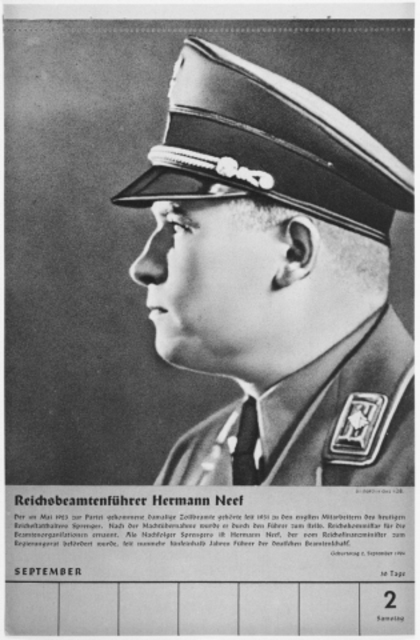
Hermann Neef
Sep 02, 1904 - Nov 18, 1950Born in Templin (Brandenburg) as a son of a teacher. 1922 graduation from high school (Abitur); then customs officer 1920s NSDAP 1923 SA 1928 high ranking customs officer (Oberzollsekretär) 1929 NSDAP district head (Bezirksleiter) Lahntal 1929-1931 council manager Frankfurt/Main 1933-1945 member of the Reichstag 1933-06 head of the German Clerk Union (Deutscher Beamtenbund) 1933-10 Neef establishes the Reichsbund of the German clerks; Reichsbeamtenführer 1933-1941 head of the committee for clerk civil service law at the Academy for German Law 1934-1945 head of the Hauptamt for clerks of the NSDAP 1938-11 SA-Oberführer of the Personalamt of the Oberste SA-Führung (OSAF) 1950 Neef dies as councilor off duty in Berlin [According to Klee, Personenlexikon zum Dritten Reich, 2007.]
- EF_NS_030_Wienbibliothek_Tagblattarchiv_Neef-Hermann.pdf
-
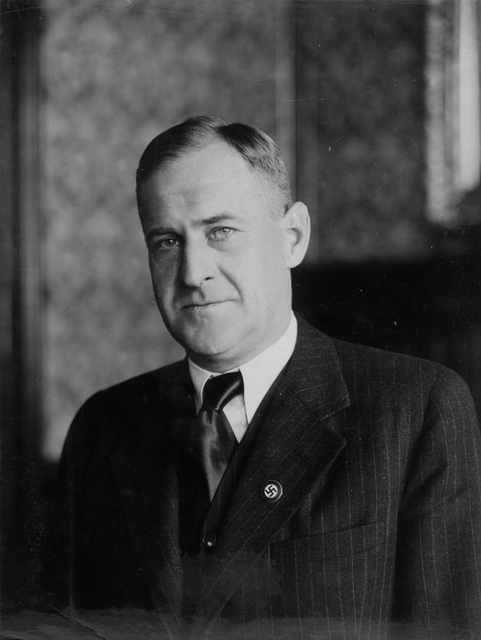
Hermann Neubacher
Jun 24, 1893 - Jul 01, 1960Born in Wels (Upper Austria) as a son of a teacher. After graduation of the Stiftsgymnasium in Kremsmünster studies of forestry at the Hochschule für Bodenkultur in Vienna. (1920 Dr.-Ing.). 1921 - 1934 Member of the managing board and by 1924 CEO of the Gemeinwirtschaftliches Siedlungs- und Baustoffanstalt (Gesiba). 1925 Founder member and till 1935 chairman of the Österreichisch-Deutscher Volksbund (Austrian movement which was in favour of the Anschluss). 1928 - 1933 President of the Österreichische Werkbund. 1932 Steirischer Heimatschutz. 1933 NSDAP. 1937 Consultant of the IG-Farben in Berlin. 1938-03-13 - 1940-12-14 Mayor of Vienna (“neutralized“ by Bürckel by spring 1940). 1940-01 Special Representative for economic questions at the Deutsche Gesandtschaft of the Ministry of Foreign Affairs (securement of Romanian oil deliveries), extension of this task to entire Southeast Europe by 1941. 1942-10 Special Representative of the German Reich for economic and financial issues in Greece. 1943-08 Special Agent of the Ministry of Foreign Affairs for the Southeast. 1945-05 American War Captivity. 1945/46 Testimonies in the Nuremburg Trials against Kaltenbrunner and witness for the defense in the Belgrade-Trial against Mihailovic; extradition to Yugoslawia. 1951-05-16 sentenced to 20 years of forced labor in Belgrade. 1952 Release. 1954 - 1956 Consultant of the city council of Addis Abeba. 1956 Consultant for the Austrian Airlines in Austria. [According to: Klee, Personenlexikon zum Dritten Reich, 2007; Neue Deutsche Biographie, Bd. 19, Berlin, 1999.]
- Zeitung_1938-03-15_6_Das-kleine-Blatt_Neubacher-Buergermeister-Wiens.pdf
-
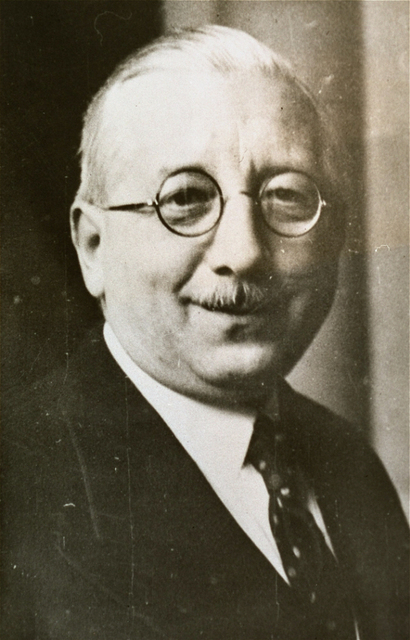
Rudolf Neumayer
May 18, 1887 - Aug 25, 1977Born in Vienna as a son of an elementary school teacher; studies law at the University of Vienna 1906 fraternity Vandalia 1912 clerk for the municipality Vienna 1914-1918 participation in World War I 1934 joins the Vaterländische Front; financial advisor and heat of the revenue board for Vienna; fraternity Albia 1936-1938 Finance minister under the Schuschnigg and the Seyß-Inquart administration 1936-1945 director general of the Wiener Städtische Versicherung 1943 head of the central office of the Wirtschaftstreuhänder 1945 imprisonment 1946-02 according to the war criminal law (Kriegsverbrechergesetz) he is sentenced to life imprisonment because of high treason 1948 gets released because he is considered unfit for prison 1957 repeal of the verdict 1958 co-founds and works for the “Wohnungseigentums-Verwaltungsgesellschaft” (later on Wevig) 1977 Neumayer dies in Vienna [According to Neue Deutsche Biographie, Bd. 19, Berlin 1999.]?
-

Walter Nitsche
Jul 04, 1917 - Jul 13, 1991Cameraman
-
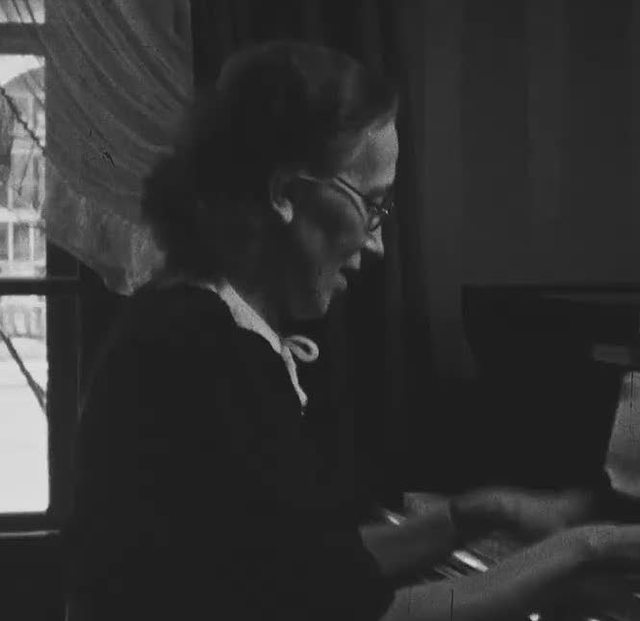
Olga Novakovic
1884 - 1946Friend of the Regenstreinf/Illich Family; Music Teacher
Student of Arnold Schoenberg (from 1918-1919); Pianist of the "Vienna Circle"; Friend of the Regenstreif / Illich Family. Died in Vienna in 1946 at the age of 62.
-
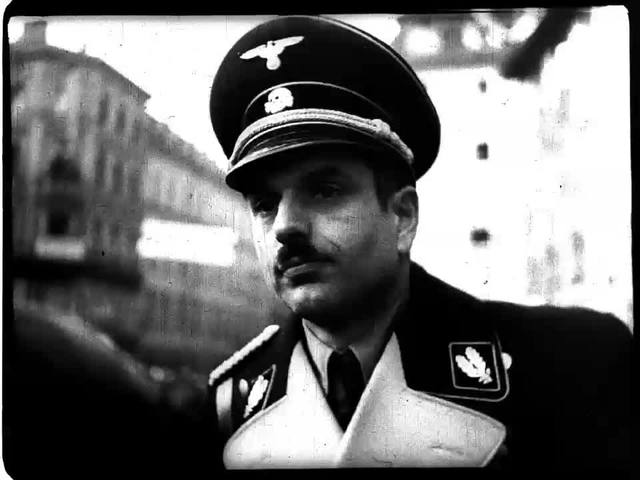
Walther Oberhaidacher
(Walther Philipp Anton Oberhaidacher)
Sep 22, 1896 - Apr 30, 1945Born in Bolzano as a son of a merchant. 1915 graduates from high school (Abitur) 1915-1918 participation in World War I 1919 studies engineering at the Technische Hochschule Graz (does not graduate) 1924 NSDAP 1928-05 Gaupropagandaleiter and deputy Gauleiter of Styria 1928-11 Gauleiter of Styria 1929 member of the Graz borough council 1933 flight to Germany (NSDAP ban in Austria) 1936-1945 member of the Reichstag 1938-01 SS 1938-04 Chief of Police of Bochum 1944-03 Chief of Police of Dresden 1945 Oberhaidacher probably dies during the bombings of Dresden. [According to Internet-Portal "Westfälische Geschichte".]
-

Jules Pressner
Mar 09, 1899 - May 1992Friend of the Tennenbaum Family
As Marcus Tennenbaum prepared to flee Austria, he shipped many of his family's possessions to Jules Pressner and Victor Ergas in Paris. Marcus reclaimed the items when he and his family passed through Paris on the way to board the Queen Mary in Cherbourg in March 1939. Marcus writes in his memoir that Pressner managed to escape when the Nazis invaded France.
-
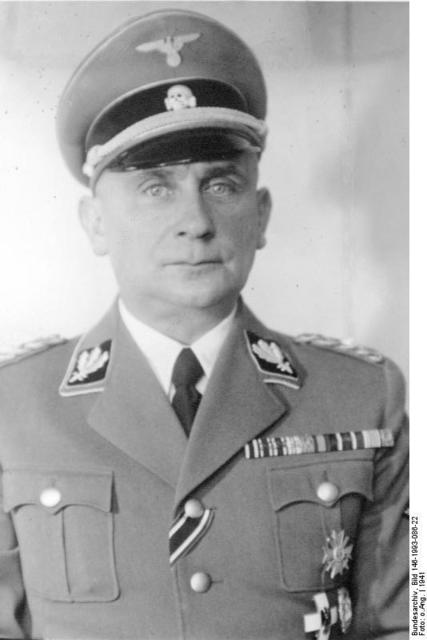
Rudolf Querner
Jun 10, 1893 - May 27, 1945Born in Lehndorf/Kamenz (Saxony) as a son of a farmer and lord of the manor. After graduating Gymnasium attendance of the cadet corps (Hamburg) and the war academy (Hanover). 1914-1918 Officer in World War I; French war captivity. 1919 Ordungspolizei in Saxony. 1933 NSDAP. 1937 Inspector of the Ordnungspolizei Hamburg. 1938 SS. 1940-11 Generalinspekteur of the Gendarmerie and Schutzpolizei. 1941-05 – 1943-01 Höherer SS- und Polizeiführer (HSSPF) North Sea in Wehrkreis X; operating from Hamburg. 1943-01 – 1944-10 HSSPF Danube in Wehrkreis XVII; operating from Vienna. 1944-10 HSSPF Mitte in Wehrkreis XI; operating from Brunswick. 1945-05-27 Suicide after being arrested. [According to: Klee, Personenlexikon zum Dritten Reich, 2007.]
-
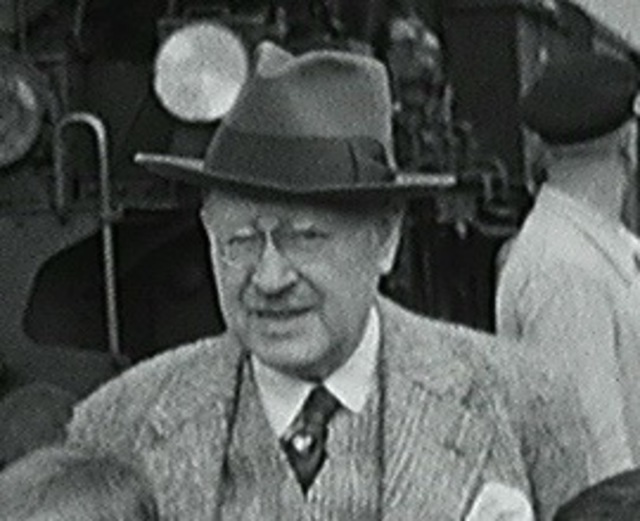
Friedrich Regenstreif
(Fritz "Pucki" Regenstreif)
Nov 14, 1868 - May 08, 1941Born in Tschernowitz (today: Tscherniwzi, Ukraine) as a son of Rose (born Barasch) and Willhelm Regenstreif. 1905 Converts together with his wife Johanna (born Ortlieb; 1877-12-12 - 1934-06-22) from the Mosaic to the Protestant creed; they have two children: Paul (1899) and Ellen (1901); Friedrich joins the wood trading company of his wife’s family (Eissler & Ortlieb; by 1925 Krivaja Aktiengesellschaft ) which establishes at the turn of the century a forestry in Zavidovici (Bosnia); Friedrich is member of the company and acts temporarily as CEO. 1910/13 - 17 The architect Ludwig Ohmann builds a mansion in Pötzleinsdorf for the family Regenstreif. 1932 Friedrich’s daughter Ellen leaves Yugoslavia and returns with her three sons to the family mansion. 1934-06-22 Death of his wife. 1940 The Deutsche Arbeitsfront (DAF) shows interest in buying the property. 1941-03-08 Under pressure Friedrich signs the treaty to sell the mansion; because of his bad health the family is allowed to stay in the mansion until he dies. 1941 dies in Pötzleinsdorf.
-
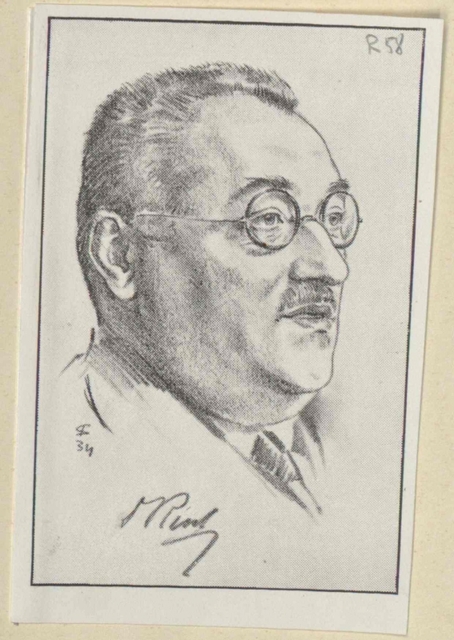
Josef Resch
Sep 28, 1880 - Apr 06, 1939Born in Vienna as a son of a master glaser; Studies Law at the University of Vienna (Dr. iur. 1907); member of the Christian Social Party 1904 clerk, by 1934 head of the Arbeiterunfallversicherungsanstalt (workers’ insurance company) 1919-1923 member of the National Assembly 1918-1920 undersecretary of state for the government office for social administration (Staatsamt für soziale Verwaltung) 1920-1938 multiple times minister for social administration 1923 president of the Kriegsgeschädigtenfonds (fund for war veterans) 1931 habilitation 1934 government commissioner for the worker and war veteran funds in Vienna, Graz and Salzburg 1935 president of the Reichsverband of the social insurance carriers and part of the general council of the National Bank 1938 as a consequence of the Anschluss Resch is deposed of his positions by the Nazis 1939 Resch dies in Vienna due to cancer [According to Österreichisches Biographisches Lexikon - Online Edition (2015).]
-
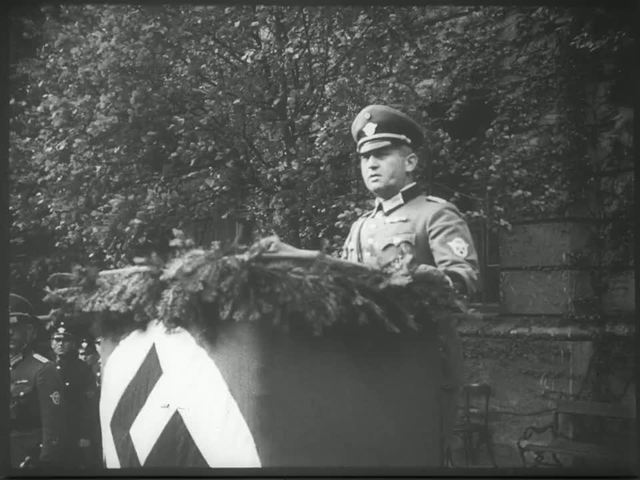
Karl Retzlaff
May 07, 1890 - Apr 23, 1967Born in Gießen (Hesse) as a son of the doctor Johann Dietz; father dies early; second marriage of his mother with the merchant Max Retzlaff; adoption. 1910 Corps Hassia-Gießen. 1910-1922 Studies law in Gießen, Munich and Marburg (1922 Dr. iur.). 1914-1918 Participation in World War I; after end of war Freikorps Schleswig-Holstein; serves at the Ordnungspolizei Hamburg. 1920 Kyffhäuserbund. 1933 Short-term member of “Stahlhelm, Bund der Frontsoldaten”. 1934-09 – 1937-03 Chief of staff at the command of the Schutzpolizei Hamburg. 1935-12 Vice-commander of the Schutzpolizei Hamburg, later commander (1937). 1937-11 NSDAP. 1939-06 Commander of the Schutzpolizei Vienna. 1939-09 SS-Oberführer. 1939-11 Inspector of the Ordnungspolizei in Wehrkreis XVII, operating from Vienna. 1940-04 Major general of the police. 1943-09 – 1945-01 Commander of the Ordnungspolizei in Hamburg. 1944-01 SS-Gruppenführer; lieutenant general of the police. 1945-1947 Imprisonment (Automatischer Arrest). Dies in Großhansdorf near Hamburg. [According to: Wikipedia - freie Enzyklopädie, 2015.]
-
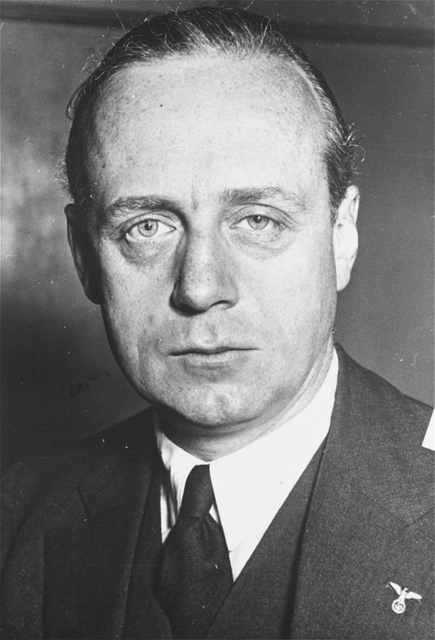
Joachim von Ribbentrop
(Ullrich Friedrich Willy Joachim Ribbentrop)
Apr 30, 1893 - Oct 16, 1946Born in Wesel (North- Rhine-Westphalia) as a son of an officer 1910-1914 stay in Canada; apprenticeship as a banker; railroad construction, news reporter, wine importer 1914-1918 return to Germany by the beginning of World War I; war participant at the eastern and the western front; by end of the war member of the German military commission in Constantinople 1919 wine trading company in Berlin; good connections to the high aristocracy 1925 receives title of nobility by bought adaption 1930 encounter with Hitler 1932 NSDAP 1933-05 SS-Ehrenführer ranking as a Standartenführer 1933 member of the Reichstag; Hitler’s foreign policy adviser (“Dienststelle Ribbentrop”) 1935 head of the Amt for außenpolitische Sonderfragen (department for special foreign policy issues); ambassador extraordinary in London 1936-1938 ambassador in London 1938-02-04 foreign minister 1939-08-23 signs the Molotov-Ribbentrop-Pact in Moscow 1940-09-27 proclaims the Tripartite Pact in Berlin 1940 SS-Brigadenführer 1941-1945 Ribbentrop accelerates in cooperation with the SS the persecution and murder of the European Jews 1945-05 Hitler nominates Seyß-Inquart as new foreign minister in his last will; Ribbentrop goes underground in Hamburg 1945-06-14 uncovering and detention by the British military administration 1946-10-01 is found guilty in all counts and sentenced to death 1946 gets executed in the prison Nuremberg [According to Klee, Personenlexikon zum Dritten Reich, 2007; Deutsches Historisches Museum - online (2015).] ?
-
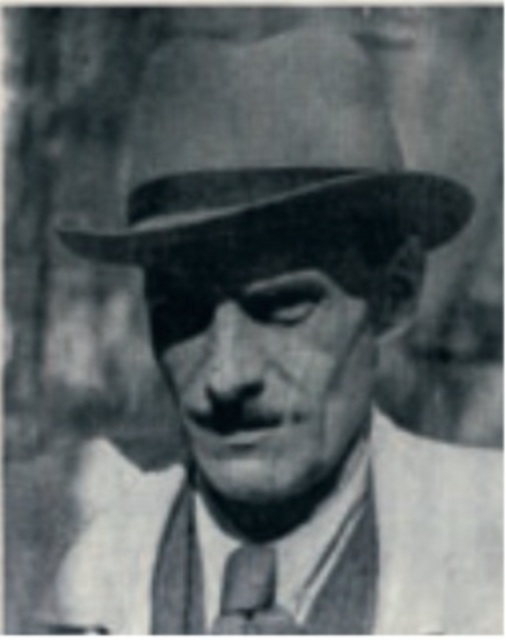
Franz Rossak
(Frank Ward Rossak)
Feb 13, 1901 - Oct 25, 1957Filmmaker
Born in Vösendorf (Lower Austria); attendance of the commercial school; as a pupil he conducts film productions for schools 1916 volunteer for the Österreichisch-Ungarische Kinoindustrie GmbH (Anton Kolm); then chief engineer for the Fakir-Company and fund manager of the Imperial-Film 1920 is sent to Berlin as an assistant director of the Regent-Film 1921 return to Vienna; directing debut “Die beiden Rivalen” 1925-1930s produces multiple worker films ( e.g. “Mr. Pim’s Trip to Europe”) 1938 banned from working; does for a living by selling substandard film copies 1947 foundation of Pax-Film; produces the documentary “Der Leidensweg Österreichs” (today: “Sturmjahre”) by using his own archive (1937) and contemporary material [According to Büttner, Dewald. Über Ruinen zum neuen Leben, 2006.]
-
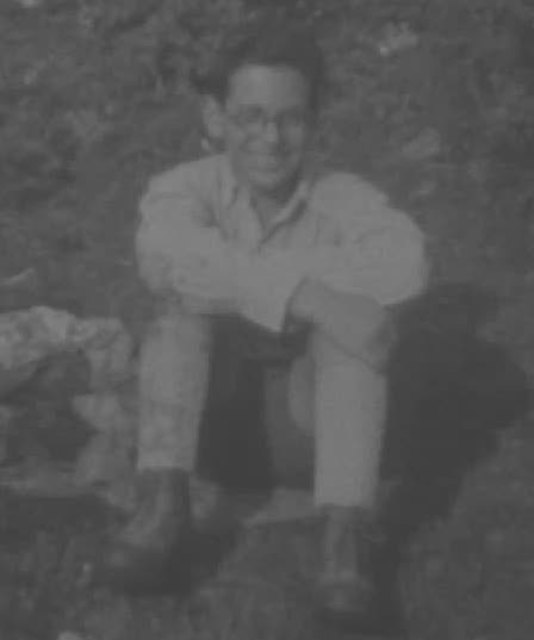
Fritz Sacher
(Fred Sacher)
1920 - 2006Born in Vienna as a son of Grete (nee Flack) and the clock maker Israel “Iso” Sacher; after the Anschluss Fritz emigrates to Israel; his mother dies in Theresienstadt in 1942, his father in Auschwitz in 1944; in Isreal he marries Marion Raab; two mutual children. 1960 the family moves to New York. [According to Mautner, Unsere Familiengeschichte, 1958; Interview mit Marianne und Peter Flack in Wien, Mai 2011.]
-
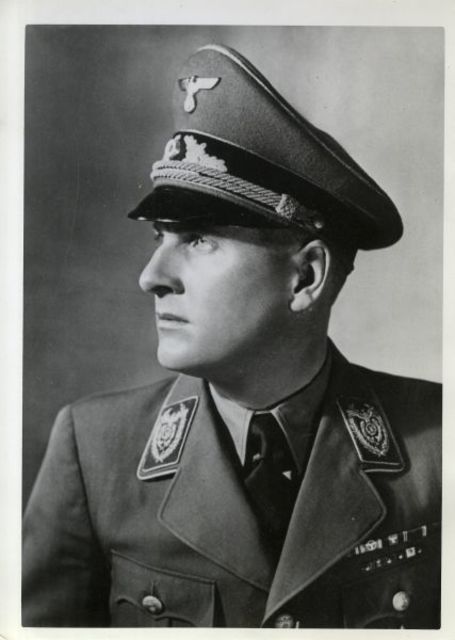
Baldur von Schirach
(Baldur Benedikt von Schirach)
May 09, 1907 - Aug 08, 1974Born in Berlin as a son of a lieutenant and later theater director. 1924 Wehrjugendgruppe “Knappschaft”. 1925 NSDAP. 1927 SA; Abitur. 1928-1931 Reichsführer of the NS-Studentenbund. 1931-10 Appointed by Hitler to the NS-Reichsleitung as the Reichsjugendführer. 1932 Reichsleiter of the NSDAP for youth education; Reichsführer of the Hitler Youth. 1933-06 Jugendführer of the German Reich; in this position state secretary in the Ministry of Interior, later in the Ministry for Science, Education and Volksbildung. 1940-08-07 Gauleiter and Reichsstatthalter of Vienna (remains Reichsleiter for youth education). 1945-06 Arrest; American war captivity. 1946-10 Sentenced to 20 years in prison for crimes against humanity (deportation of Viennese Jews) at the Nuremburg Trials. 1966-09 Released from Berlin-Spandau. [According to: Klee, Personenlexikon zum Dritten Reich, 2007; Neue Deutsche Biographie, Bd. 23, Berlin 2007.]
-
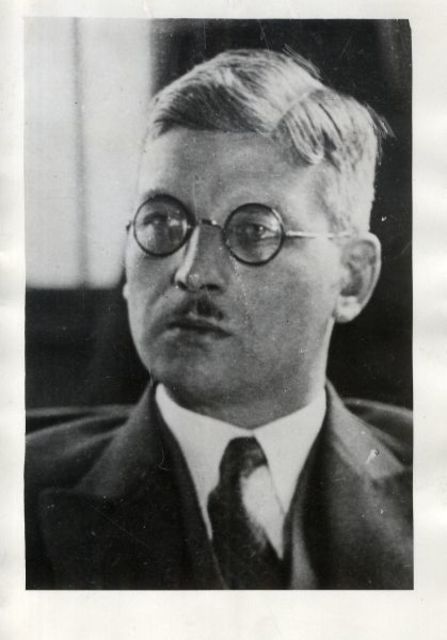
Kurt Schuschnigg
(Kurt Alois Josef Johann Edler von Schuschnigg)
Dec 14, 1897 - Nov 18, 1977Born in Reiff/Gartsee (today: Riva del Garda, Italy) as a son of a colonel brigadier (Oberstbrigadier); Jesuitengymnasium in Feldkirch (1915 Matura) 1915-1918 war volunteer 1918-1919 Italian war captivity 1919-1922 studies Law at the University of Freiburg/Breisgau and the University of Innsbruck (1922 Dr. iur); AV Austria Innsbruck (Cartellverband) 1924 law firm in Innsbruck 1927 member of parliament for the Tyrolian People’s Party 1930 founder of the Wehrverband Ostmärkische Sturmscharen 1932 minister of justice 1933-1934 additionally minister of education 1934-07-29 – 1938-03-11 chancellor (becomes Engelbert Dollfuß’ successor, who was killed by the Nazis during the July Putsch); temporarily additionally minister of defense and foreign minister 1936 head (Bundesführer) of the Vaterländische Front 1938-02-12 signs under Hitler’s pressure the Berchtesgadener Abkommen 1932-02-16 appoints Arthur Seyß-Inquart minister of interior and security 1938-03-09 announces a referendum for 1938-03-13 regarding Austria remaining indepentend 1938-03-11 is forced by Hitler to resign; Seyß-Inquart takes over his chancellorship; Schuschnigg is placed under house arrest 1938-05 detention in the Gestapo headquarters in the former hotel Metropol; then transfer to Munich and Berlin; later on imprisonment in the concentration camps Dachau and Flossenbürg. 1941-1945 special prisoner in the concentration camp Sachsenhausen 1945-04/05 transfer to Niederdorf, South Tyrol; SS hostage; liberation by a Wehrmacht company 1945-1945 stay in Italy 1948 emigration to the US; teaches international law at the Catholic University St. Loius (Missouri) 1956 US citizenship 1977 return to Tyrol 1977 Schuschnigg dies in Mutters (Tyrol) [According to Neue Deutsche Biographie, Bd. 23, Berlin 2007; Deutsches Historisches Museum - online (2015).]?
-
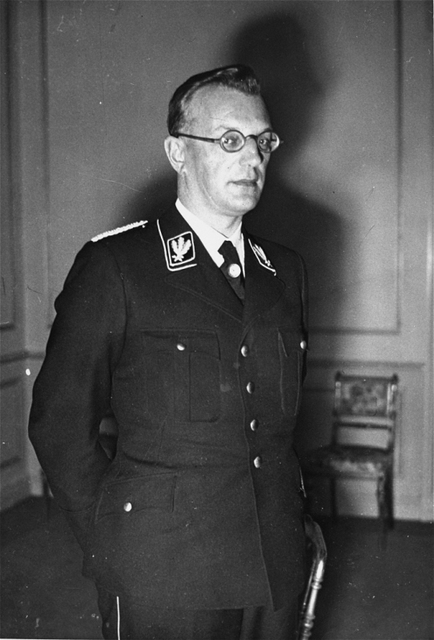
Arthur Seyß-Inquart
Jul 22, 1892 - Oct 16, 1946SS-Obergruppenführer, Chancellor and Reich Governor
Born in Stannern/Iglau (today: Stanorov, Czech Republic) as a son of a high school head master 19110-1917 studies law at the University of Vienna (1917 Dr. iur.) 1915-1918 participation in World War I 1921 lawyer in Vienna; active part of the Deutsch-Österreichischer Volksbund and the Styrian Heimatschutz 1925 party executive of the Deutsch-Österreichische Volksbund 1931 expands contacts to the NSDAP 1936 under political pressure from the German Reich he is appointed member of the Staatsrat 1938-02-16 as a consequence of the Berchtesgadener Abkommen he is appointed minister of interior and minister of security by chancellor Schuschnigg 1938-03-11 after Schuschnigg’s resign he is appointed chancellor 1938-03-13 after Miklas’ resign he gains presidential powers 1938-03-16 Reich Governor ranking as a SS-Obergruppenführer 1939-05-01 as a consequence of the disintegration of the Austrian government (Ostmarkgesetz) he becomes minister without portfolio 1939-10 deputy Governor General of the General Government Poland 1940-05 Reich commissioner of the Netherlands 1939-1945 responsible for a great number of crimes in Poland and the Netherlands (repressive measures, pillage, forced labor, deportation, hostage shootings) 1945-05-01 in his last will Hitler nominates Seyß-Inquart as new foreign minister 1945 detention in the Netherlands by Canadian troops 1946-10-01 is sentenced to death in the Nuremberg major war criminals trial because of planning, unleashing, and implementation of an aggressive war, war crimes, and crimes against humanity 1946 execution in Nuremberg [According to Klee, Personenlexikon zum Dritten Reich, 2007; Deutsches Historisches Museum - online (2015).]
-
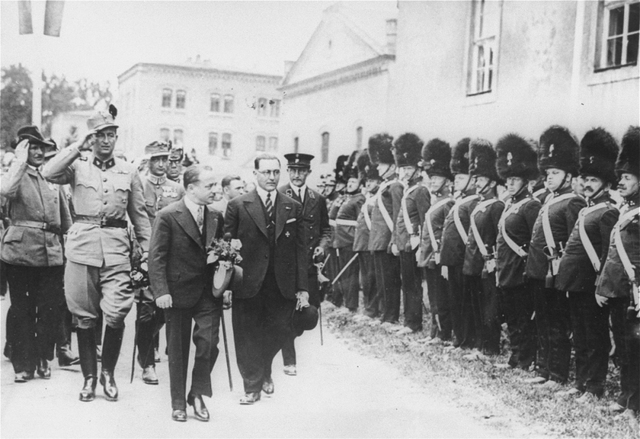
Ernst Rüdiger Starhemberg
May 10, 1899 - Mar 15, 1956Born in Eferding (Upper Austria) as a son of a big landowner 1914-1918 participation in World War I 1920 studies national economics at the University of Innsbruck; Corps Rhateia-Innsbruck 1921 Freikorps Oberland; takes part in the Battle of Annaberg (Sturm auf Annaberg) 1923 participation in the Hitler putsch 1929 Heimwehrführer in Upper Austria 1930 Bundesführer of the Austrian Heimwehr; member of the National Assembly; temporarily minister of interior under the Vaugoin administration 1933 urges disempowerment of the social democratic city government of Vienna; requests illegal arms deliveries from Mussolini for the Heimwehr (Hirtenberger Waffenaffäre) 1933/1934 deputy leader of the Vaterländische Front 1934 plays a prominent role in the suppression of the Juliputsch; after the murder of Dollfuß Starhemberg is talked about as Dollfuß’ successor; remains vice chancellor; gains additionally the department of the security ministry 1934-1936 Bundesführer of the Vaterländische Front 1936 is forced by Schuschnigg to resign (Phönix-Skandal; connections to Mussolini); Starhemberg resigns form all of his positions; ban of the Heimwehr 1937 emigrates to Switzerland 1940-1942 France; joins the French army 1942-1955 Argentina 1955 return to Austria 1956 Starhemberg dies in Schruns (Vorarlberg) due to a heart attack [According to Prieschl, Starhemberg, 2008.]
-
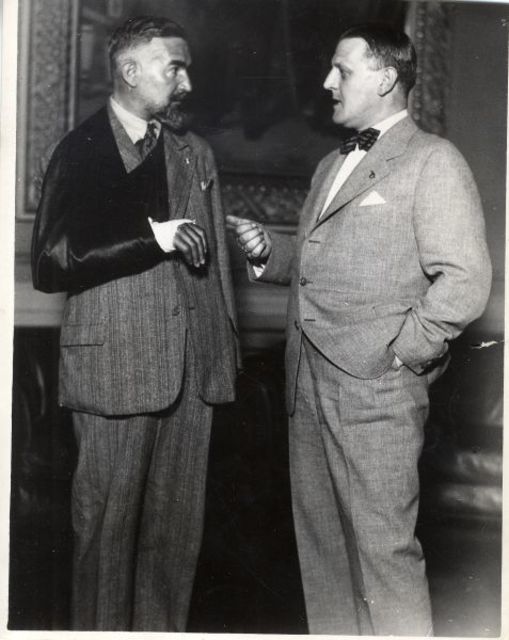
Richard Steidle
Sep 20, 1881 - Aug 30, 1940Born in Untermais (Tyrol) as a son of a merchant 1901-1908 studies law at the University of Innsbruck (1908 Dr. iur.) 1914-1918 unfit for war; serves as a military court intern 1918 law firm in Innsbruck 1918-1919 member of the provisional Landesversammlung (state parliament) 1919 member of the Tyrolian Landtag (state parliament) 1919-1921 and 1933-1934 Landesrat in Tyrol 1920-05 Steidle establishes the Tyrolean Heimatwehr 1922-1931 member of the Bundesrat (Federal Assembly) 1923 chairman of the Vereinigung der Alpenländischen Schutzverbände 1926-1930 Bundesführer auf the Austrian Heimatschutz (in conjunction with Walter Pfrimer) 1932-1934 deputy Bundesführer of the Austrian Heimatschutz 1933 federal commissioner of the Heimwehr for Propaganda; head of security of the Tyrolean Land government; injury because of NS assassination attempt 1934 Steidle gets politically neutralized 1934-1938 consul general of Trieste 1938 after the Anschluss imprisoned by the Nazis; detention in the concentration camp Buchenwald 1940 Steidle is shoot dead on an alleged flight attempt [According to Österreichisches Biographisches Lexikon - Online Edition (2015).]
-
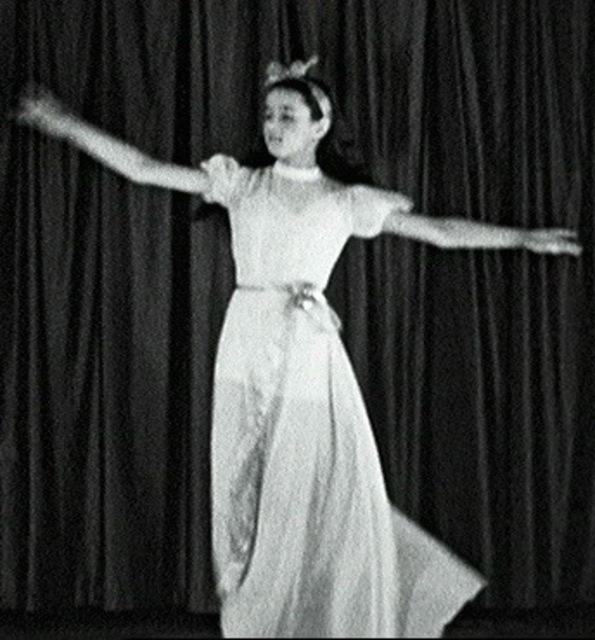
Marion Stein
(Maria Donata Nanetta Paulina Gustava Erwina Wilhelmine Harewood, Thorpe)
Oct 18, 1926 - Mar 06, 2014Marion Stein was the daughter of Erwin Stein, a very important colleague of Mahler, Bartok, Weber. Marion was a close friend of Ivan Illich.
-
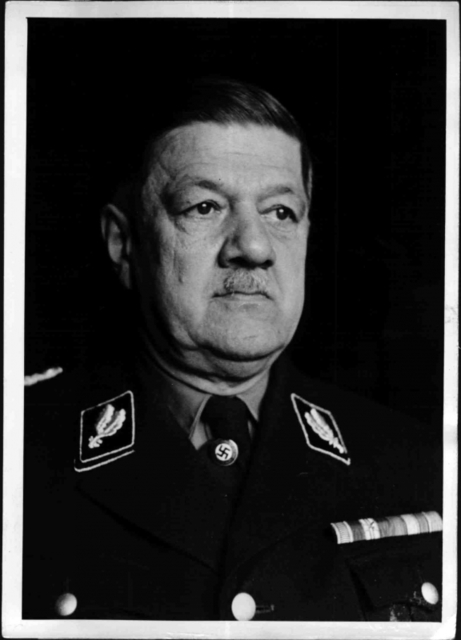
Otto Steinhäusl
Mar 10, 1873 - Jun 20, 1940Born in Budweis (Ceske Budejovice, Czech Republic) as a son of a lieutenant. 1898 - 1905 Studies law at the University of Vienna (1905 Dr. iur.). 1902 One-year volunteer. 1906 Court internship. 1907 Konzeptspraktikant at the police administration of Vienna; police service at various places of employment (Vienna, Ostrava, Salzburg) 1915 Military department of the state police in the police headquarters. 1919 Polizeioberkommissär. 1921 Polizeirat. 1922 Temporary head of the police administration Salzburg. 1931 Deputy head of the police administration Vienna. 1932 Head of the security office. 1933 Head of the der kriminalpolizeiliche Approbationsgruppe II. 1934 Arrested because of participating in the July coup (contributory fault in high treason); sentenced to seven years of prison by a military court in 1935. 1936-06 Released from prison because of the Juliabkommen; moves to the German Reich. 1938-03 SS-Oberführer. 1938-03-13 At Ernst Kaltenbrunner’s urging appointed as (commissarial) Chief of Police of Vienna. By 1940-02 permanently at sick leave; dies in Vienna suffering from cancer; Leo Gotzmann becomes his successor. [According to: Seyrl, Sicher durch die Zeit, 2012; Österreichisches Biographisches Lexikon - Online Edition (2015).]
-
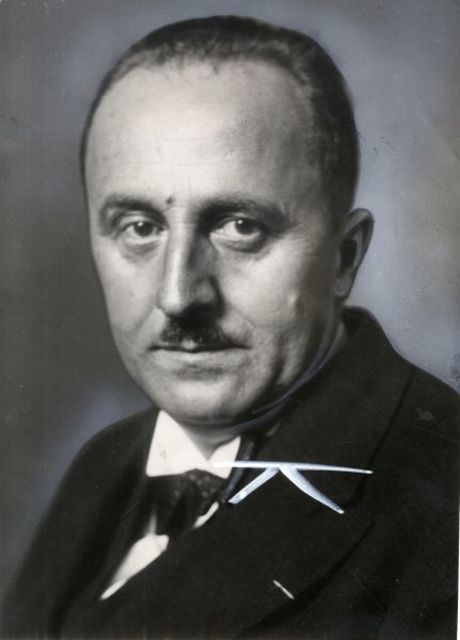
Wilhelm Taucher
May 26, 1892 - Apr 18, 1962Born in Fürstenfeld (Styria) as a son of a thrift manager; participation in World War I; studies law as well as governance and public policy at the University of Graz (Dr. iur. 1918) 1923 habilitation 1929 associate professor at the University of Graz 1931-1937 head of the chamber office for the chamber of commerce, trade and industry 1934-1936 member of the Styrian Landtag (state parliament); economic advisor of the Styrian government 1936-01-01 – 1938-02-16 minister for commerce and traffic 1938-03 as a consequence of the Anschluss he is deposed of all of his positions 1940 military service ranking as an officer; after end of the war tenured professorship for economics and political economy at the University of Graz 1949-1953 agent for the Marshall plan 1954-1955 principal of the University of Graz 1962 Tauchner dies in Graz [According to Ibler (et al), Geschichte der Rechtswissenschaftlichen Fakultät der Universität Graz, 1985.]
-
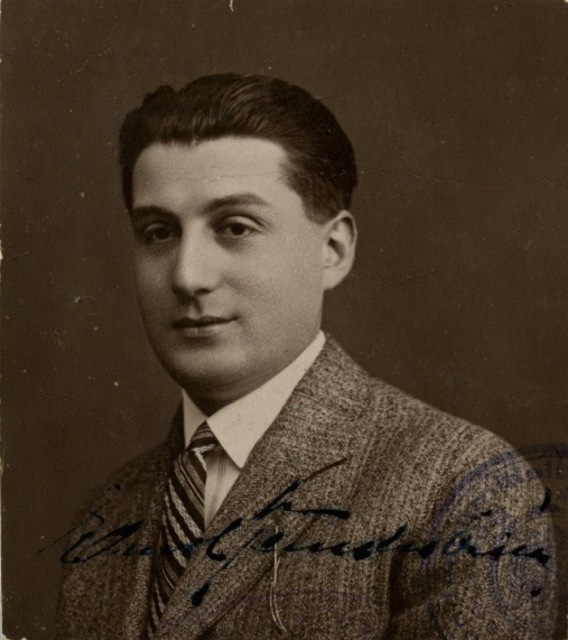
Emil Tennenbaum
(Emil Tanner)
Apr 24, 1903 - Mar 23, 1981Emil Tennenbaum was born in Zalesczicki, Galicia (today, Ukraine) around 1903. He married Dora Austein in 1934. They had immigrated to Austria in 1914. Edith was born in Vienna in on November 12, 1936, and her younger brother George was born in 1938. On March 12, 1938 Nazi Germany annexed Austria. The following November the Kristallnacht pogrom broke out throughout Germany and Austria. That evening, together with other Jewish men, Edith's father was arrested and taken to Dachau. The Nazis bolted her apartment, and Dora being without food, diapers or drink for her babies ran across town with the two children to her sister-in-law's apartment where they remained until leaving Vienna. After a month and a half Emil was released after receiving forged papers identifying him as a Dutch national and Protestant. He then fled to Belgium. Meanwhile, in October 1939, Dora, left Vienna by train to Venice together with the two young children. Her paternal aunt had been living in the U.S. for years and she sponsored their immigration. They sailed out of Genoa on the "Rex," an Italian ocean liner. Because Dora did not have a job, language skills or money, her relatives convinced her to put the two children in a children's shelter. The two children became separated not only from their mother but also from each other. Emil joined them in January 1940 arriving on the Zaandam ship from Rotterdam. He changed his name to Tanner in the US.
-
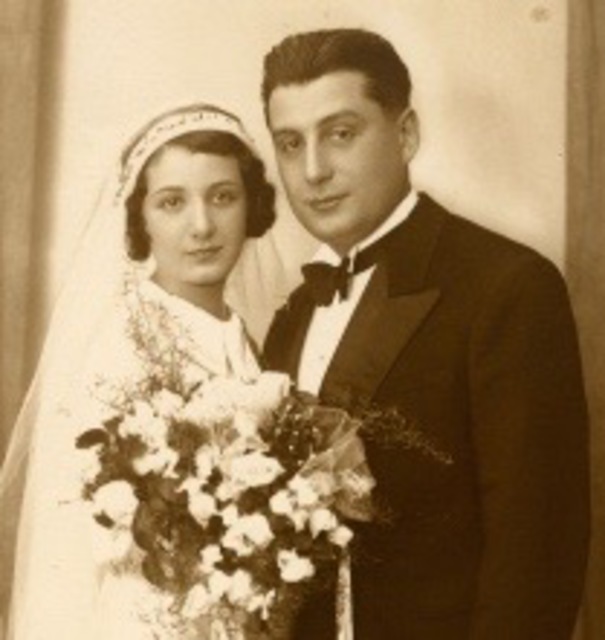
Dora Tennenbaum
(Dora Austein, Tanner)
May 15, 1913 - Jun 09, 2007Dora Austein was born in Bobrka, Galicia (today, Ukraine) around 1913. She married Emil Tennenbaum in 1934. They had immigrated to Austria in 1914. Edith was born in Vienna in on November 12, 1936, and her younger brother George was born in 1938. On March 12, 1938 Nazi Germany annexed Austria. The following November the Kristallnacht pogrom broke out throughout Germany and Austria. That evening, together with other Jewish men, Edith's father was arrested and taken to Dachau. The Nazis bolted her apartment, and Dora being without food, diapers or drink for her babies ran across town with the two children to her sister-in-law's apartment where they remained until leaving Vienna. After a month and a half Emil was released after receiving forged papers identifying him as a Dutch national and Protestant. He then fled to Belgium. Meanwhile, in October 1939, Dora, left Vienna by train to Venice together with the two young children. Her paternal aunt had been living in the U.S. for years and she sponsored their immigration. They sailed out of Genoa on the "Rex," an Italian ocean liner. Because Dora did not have a job, language skills or money, her relatives convinced her to put the two children in a children's shelter. The two children became separated not only from their mother but also from each other. Emil joined them in January 1940 and the family reunited.
-
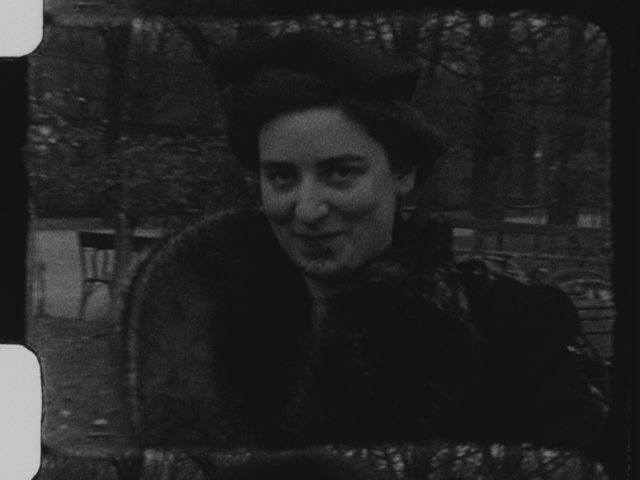
Ernestine Tennenbaum
(Erna Chajes )
Jun 21, 1909 - Jan 19, 2007Wife of Marcus, Mother of Robert Tennenbaum
Ernestine Chajes Tennenbaum was born on June 21, 1921 in Zloczow, Galicia (today, Ukraine). She married Marcus Tennenbaum and lived in Vienna. Their son, Robert, was born in 1936. Marcus was a merchant of a plywood business. Marcus was instrumental in securing exit visas and making other emigration arrangements for most members of his extended family. Marcus, Ernestine, and Robert escaped Vienna via the Queen Mary which left Cherbourg, France on March 19, 1939 and arrived in New York on March 23.
-
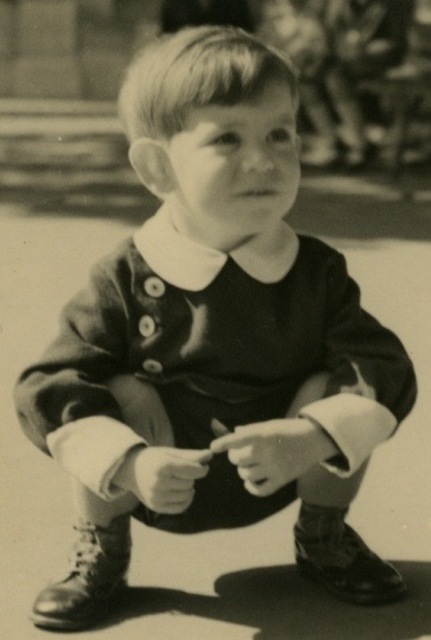
Robert Tennenbaum
(Bobby Tennenbaum)
Jun 12, 1936Son of Marcus and Ernestine, Cousin of Edith Tennenbaum
Robert lived with his parents, Marcus and Ernestine, in Vienna when the Nazis first occupied the city in March 1938. Marcus was a merchant of a plywood business. The warehouse owned by his father, Leo (Leib) Tennenbaum, was located in Vienna X, Favoriten Strasse 87. Marcus was instrumental in securing exit visas and making other emigration arrangements for most members of his extended family. Marcus, Ernestine, and Robert escaped Vienna via the Queen Mary which left Cherbourg, France on March 19, 1939 and arrived in New York on March 23.
-
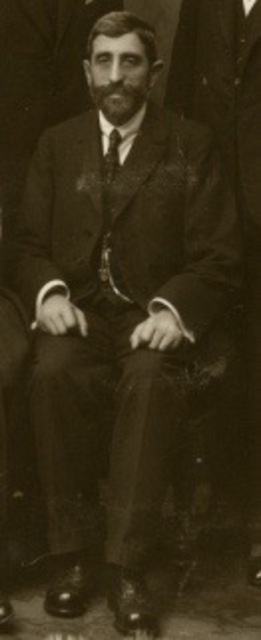
Leib Tennenbaum
(Leo Tennenbaum)
Leo (Leib) Tennenbaum owned a plywood warehouse in Vienna X, Favoriten Strasse 87. He was married to Malka. They had three children: Mina, Emil, and Marcus. Leib and Malka successfully escaped the Nazis and arrived in the United States with Dora Tennenbaum and her children, Edith and George, in November 1939.
-

Marcus Tennenbaum
(Mark Tennenbaum)
Feb 27, 1901 - Apr 1985Husband of Ernestine, Father of Robert, Brother of Emil and Mina Tennenbaum
Marcus Tennenbaum was born on February 27, 1901 in Zaleszczyki, Galicia (today, Ukraine). He, his wife Ernestine, and son Robert lived in Vienna when the Nazis first occupied the city in March 1938. Marcus was a merchant of a plywood business. The warehouse owned by his father, Leo (Leib) Tennenbaum, was located in Vienna X, Favoriten Strasse 87. Marcus was instrumental in securing exit visas and making other emigration arrangements for most members of his extended family. Marcus, Ernestine, and Robert escaped Vienna via the Queen Mary which left Cherbourg, France on March 19, 1939 and arrived in New York on March 23.
-
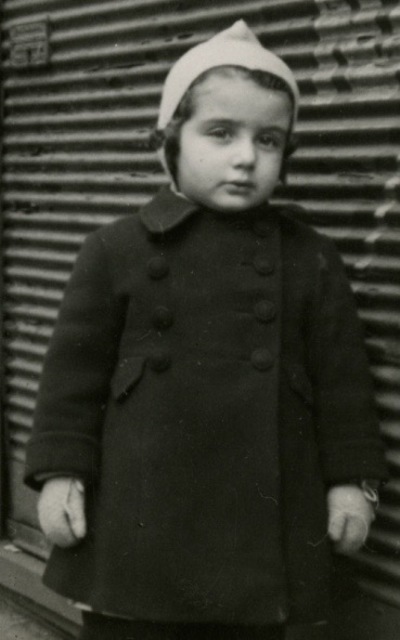
Edith Tennenbaum
(Edie Tenner, Ostern)
Nov 12, 1936Daughter of Dora and Emil, Sister of Georg, Cousin of Robert Tennenbaum
Edith Tennenbaum (now Ostern) is the daughter of Emil Tennenbaum and Dora Austein Tennenbaum. Her parents were born in Zalesczicki, Poland and Bobrka, Poland respectively. They had immigrated to Austria in 1914 and married in 1934. Edie was born in Vienna in on November 12, 1936, and her younger brother George was born in 1938. On March 12, 1938 Nazi Germany annexed Austria. The following November the Kristallnacht pogrom broke out throughout Germany and Austria. That evening, together with other Jewish men, Edith's father was arrested and taken to Dachau. The Nazis bolted her apartment, and Dora being without food, diapers or drink for her babies ran across town with the two children to her sister-in-law's apartment where they remained until leaving Vienna. After a month and a half Emil was released after receiving forged papers identifying him as a Dutch national and Protestant. He then fled to Belgium. Meanwhile, in October 1939, Dora, left Vienna by train to Venice together with the two young children. Her paternal aunt had been living in the U.S. for years and she sponsored their immigration. They sailed out of Genoa on the "Rex," an Italian ocean liner. Because Dora did not have a job, language skills or money, her relatives convinced her to put the two children in a children's shelter. The two children became separated not only from their mother but also from each other. Emil joined them in January 1940and the family reunited.
-

Test-2022-2
-

Test-2022-FN Test_2022-LN
Jan 02, 2022 - Dec 31, 2022Testing Person
-

Test_5
-
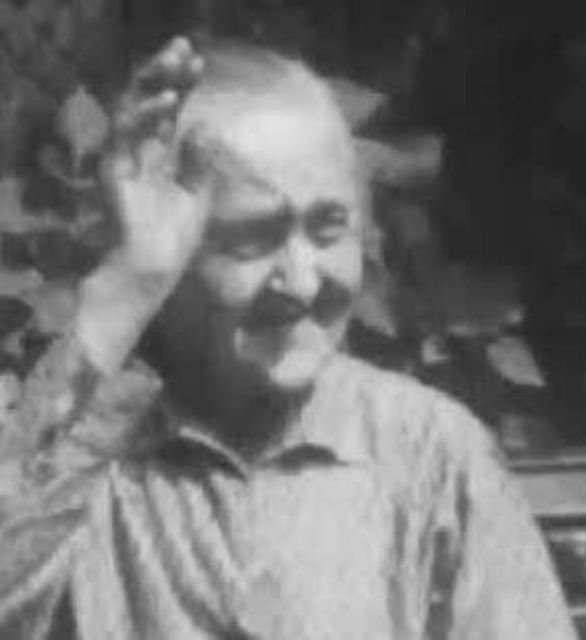
Marie Toman
1849Born in Neumarkt-Kalham (Upper Austria) as Marie Roitner; marriage with the master carpenter Georg Toman, descending from the Znaim area (today Czech Republic) and settled in Vienna (ca. 1847-1907); mother of Marie Amalie (1875) and Georg (ca. 1880). [According to Herzstark, Kein Geschenk für den Führer, 2005.] ?
-

Unidentifiziert
Persons unidentified so far.
-

Mario Wiberal
(August Maria)
Mar 04, 1898 - Nov 24, 1961Cameraman
Born in Trent as August Maria Wiberal. 1923 Wiberal starts to work as a photo journalist in Vienna (i.a. Verlag Wiener Zeitungen, Der Abend, Telegraf, Echo); by 1930 he works i.a. as a cameraman for films. 1941-1947 USA. 1947 return to Austria; editor for various newspapers (Kurier, Kronen-Zeitung, Neues Österreich) and photographer at the Pressebildagentur Franz Votava; parts of his estate can be found in the archives of the social democratic Arbeiterzeitung. 1961 Wiberal dies in Vienna. [According to Albertina - Sammlung Online (2015).]
-
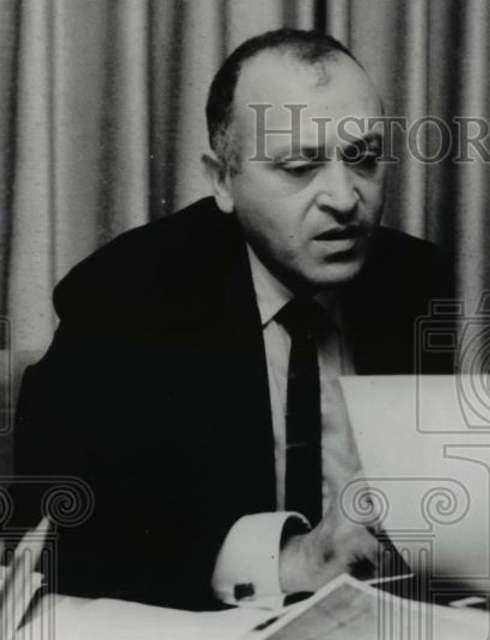
Arthur L. Zegart
1917 - 1989Cameraman
Arthur L. Zegart (1917-1989) was born in Chicago and attended the University of Chicago. During World War II, he was part of a U.S. Army Air Force combat photography unit. He covered postwar relief and refugee efforts by UNRRA and the JDC in Czechoslovakia and Austria. He became chief of the United Nations film division in the late 1940s. Later, Zegart was involved in the production of 125 documentaries, many of which he wrote and directed for network television. The 16mm films were stored in his basement for years.
-
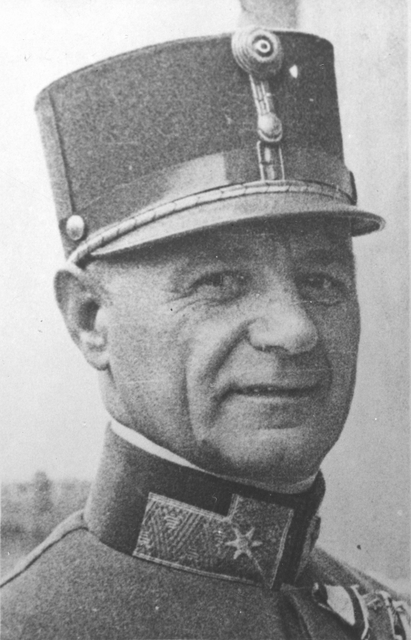
Wilhelm Zehner
(Wilhelm Petrus Zehner)
Sep 02, 1883 - Apr 11, 1938Born in Bistritz (today: Bistrita, Romania) as a son of an independent gentleman 1898 attendance of the infantry cadet school in Kamenitz 1902 infantry regiment 1909-1911 military intendant in Vienna 1914-1918 participation in World War I; Balkan and Isonzo front line 1916 captain 1918 in transferred to the Volkswehr (by 1920 Bundesheer) 1929 colonel 1933 brigade commander 1934 general of the infantry 1934-06-11 – 1938-03-11 state secretary of national defense in the ministry of defense; important reformer of the Bundesheer (“father of the Austrian Bundesheer”) 1938-02/03 contrary to Schuschnigg he advocates to use the Bundesheer to defend in case of an German invasion 1938 Zehner is found shoot dead in his Viennese apartment; his murder by the Gestapo is hushed up as a suicide [According to Angetter, Gott schütze Österreich!, 2006; doew.at (2015).]
-
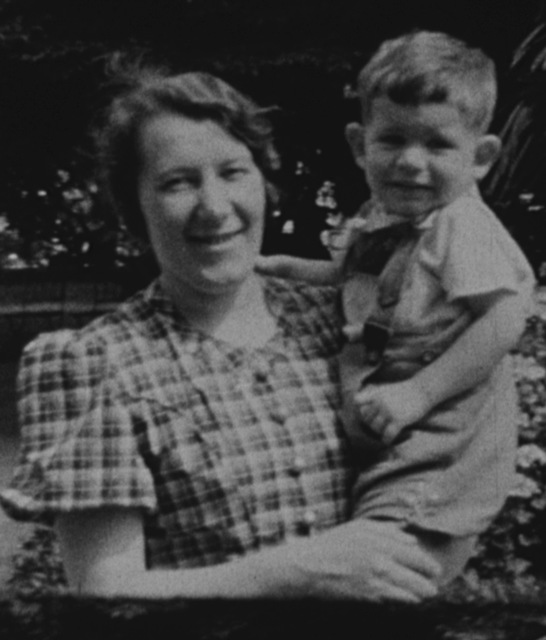
Hedy [?]
Hedy was a maid for the Tennenbaum family in 1938. Marcus Tennenbaum explains in his memoir that the family employed maids until September 1938 when they were forbidden to work for Jews any longer. He writes, "They had no chance to get jobs with Christian homes, ours cried and had to return to their families in the countryside to work on the farms to which they were not used any more, having lived in the big city for many years (439)."
-
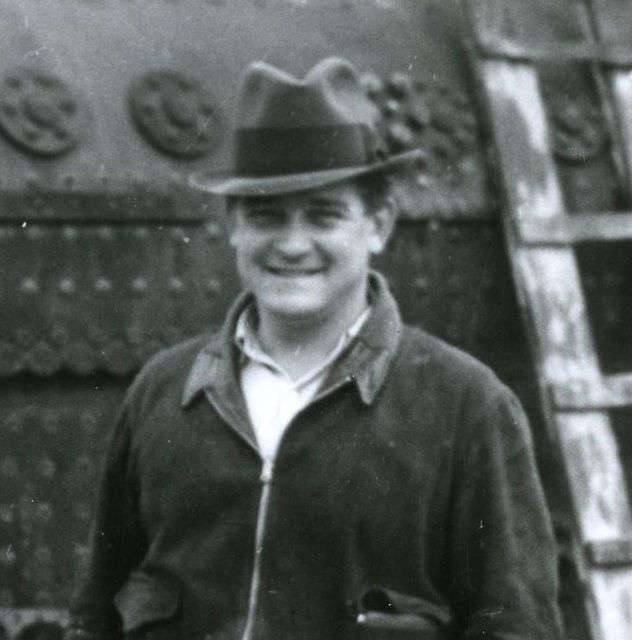
Richard Keith van Sickle
Oct 15, 1899 - Jul 02, 1961 -
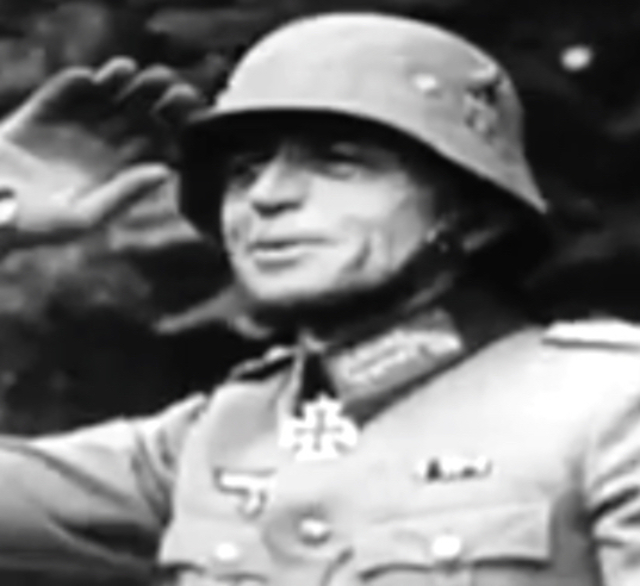
Kurt von Briesen
(Kurt Alfred Otto Erimar)
May 03, 1883 - Nov 20, 1941





